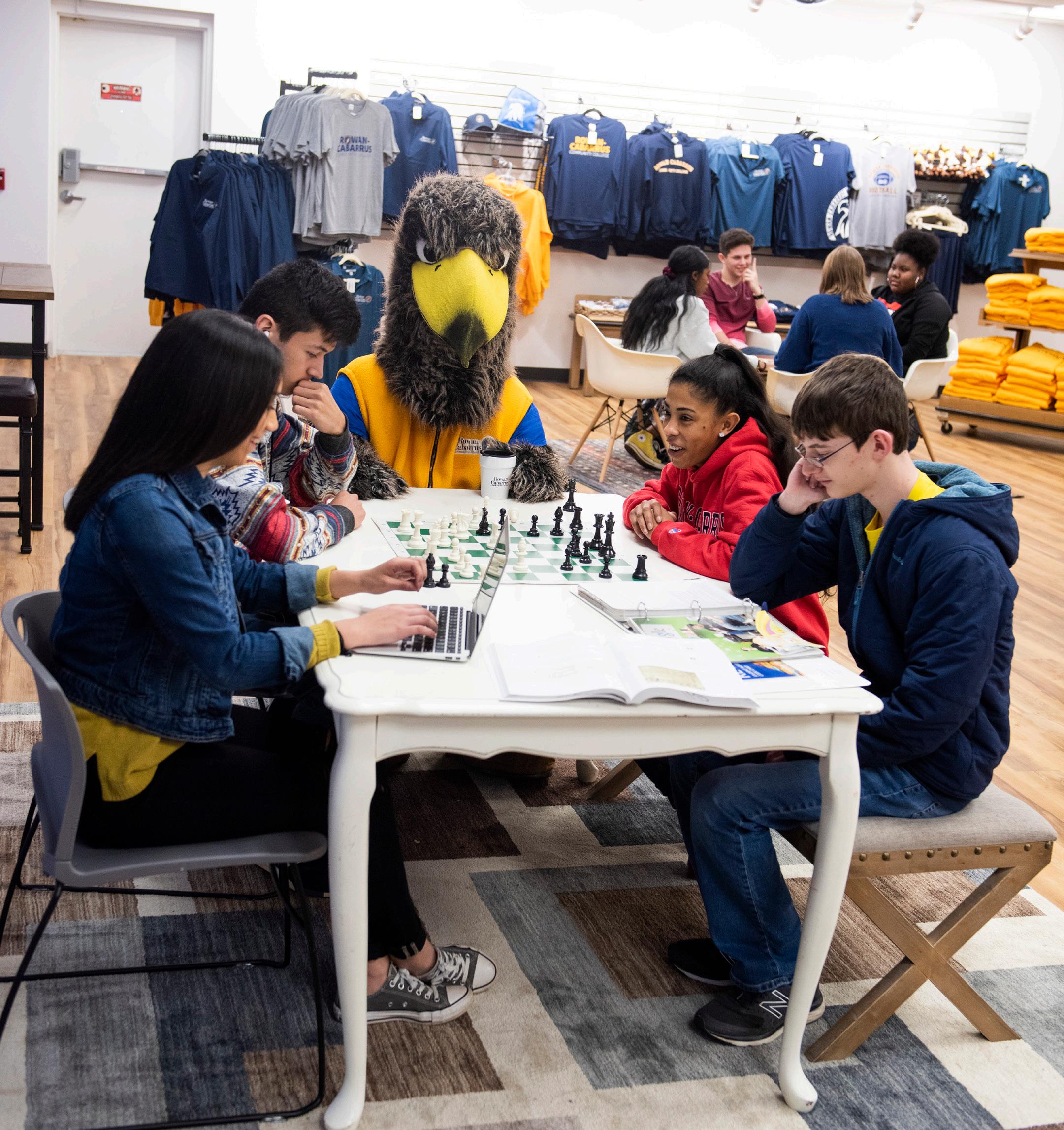2018 A YEAR OF Engagement





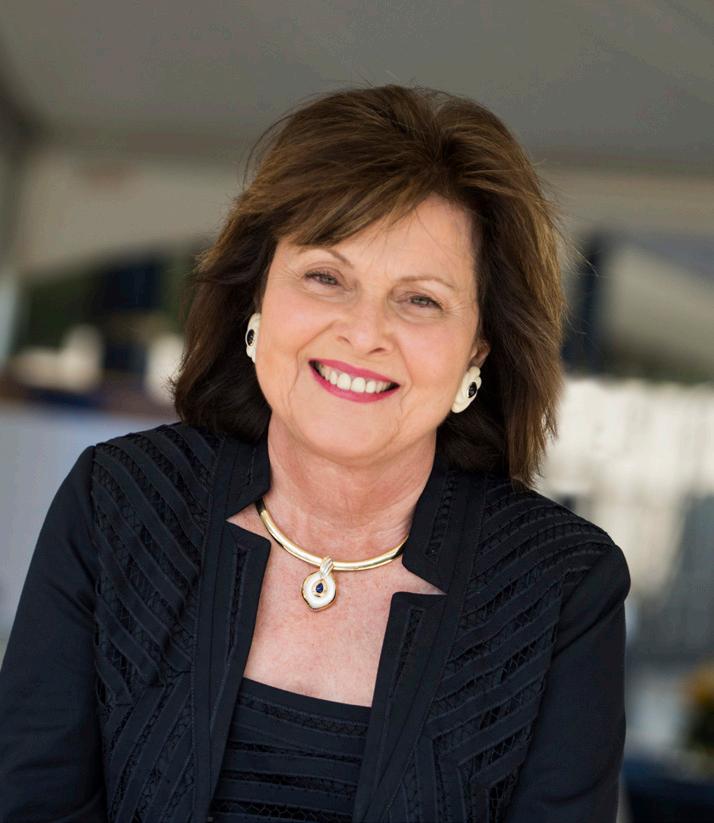
At Rowan-Cabarrus Community College, our mission to serve our students and create positive change in the communities we serve would not be possible without engagement – engagement among our own leaders, board members, faculty, staff and students, as well as the connections we form with businesses, government, donors, and our neighbors.
Education, at its very core, is about engaging the mind toward deep understanding, critical thinking, and transferring knowledge into action. This is what prepares our students and our regional workforce for success.
We have grown as an institution by anticipating and preparing for change, but this has not happened by accident. Progress takes place through purposeful analysis, collaboration, commitment and action. RowanCabarrus is dedicated to providing first-rate instruction and opportunities that lead to lucrative, sustainable jobs in growing fields. In fact, with our eye on the future, we are building educational pathways for some jobs that do not even exist yet.
Rowan-Cabarrus continually enters into partnerships that will lead to a vibrant future for students on all of our campuses. Our new Advanced Technology Center is under construction on land donated by David Murdock on the North Carolina Research Campus. This new community resource, which is a result of collaboration between the College, Cabarrus County, the City of Kannapolis and Castle & Cooke, will help bring new manufacturing jobs to our area and continue to advance our reputation as a leader in education and workforce development.
As a participant in the exciting Kannapolis revitalization plan, Rowan-Cabarrus relocated our cosmetology program to its new location, College Station, to allow the city to continue its work while providing improved facilities for our students (full article on page 23).
Every day in our region, many of the dedicated professionals in uniform who protect and heal us were educated at Rowan-Cabarrus Community College. Police, firefighters and a host of health care professionals who serve us received their training here. Our fire and emergency services program continues to grow and receive national recognition. We have also expanded our health care offerings in recent years with the addition of our new physical therapist assistant and occupational therapy assistant programs.
Rowan-Cabarrus brings new hope to our region every day, as we equip thousands of men and women with relevant new skills, confidence, knowledge and the ability to create a bright future for themselves. I am proud of this institution and the work we do every day to leverage the power of learning to improve lives in Rowan and Cabarrus counties and beyond.

Every day I see the hard work and dedication of the Rowan-Cabarrus Community College faculty and staff members. As chair of the Rowan-Cabarrus Community College Board of Trustees, I continue to have the privilege of working with these individuals who are dedicated to making higher education accessible and affordable in Rowan and Cabarrus counties.
2018 was a year of growth for the College with the expansion of four campuses and several academic programs. I continue to be amazed at the engagement with our partners and drive of the College and our communities to make our region successful and attractive to new industry and business ventures. In preparation for the institution’s future needs, the College doubled its acreage at South Campus. 2018 also saw the completion of the first solar energy project on North Campus. Due to this generous donation, students will have more opportunities for scholarships.
I am sure that I speak for the entire Board of Trustees when I say that I am proud to have Rowan-Cabarrus serve as a catalyst for advancing the region.
• Rowan-Cabarrus is the eighth largest in enrollment among the 58 North Carolina community colleges.
• Sixty-four percent of our students are female, 36 percent are male, 65 percent are under 30 and 38 percent are minorities.
• Forty-five percent of our students work full- or part-time.

• Approximately 57 percent of RowanCabarrus students are enrolled in Corporate and Continuing Education classes.
• Rowan-Cabarrus employs nearly 377 full-time faculty and staff members, as well as over 930 part-time faculty and staff.
15:1 FACULTY TO STUDENT RATIO
OFFERS
37 DEGREES 23 DIPLOMAS 101 CERTIFICATES
OFFERED COMPLETELY ONLINE DEGREES
25,000OVER STUDENTS ANNUALLY

“Celebrate your success although this may not be your end goal. Be proud of yourself because you are the image of someone else’s goal. Let me say this again… You are the image of someone else’s goal.”

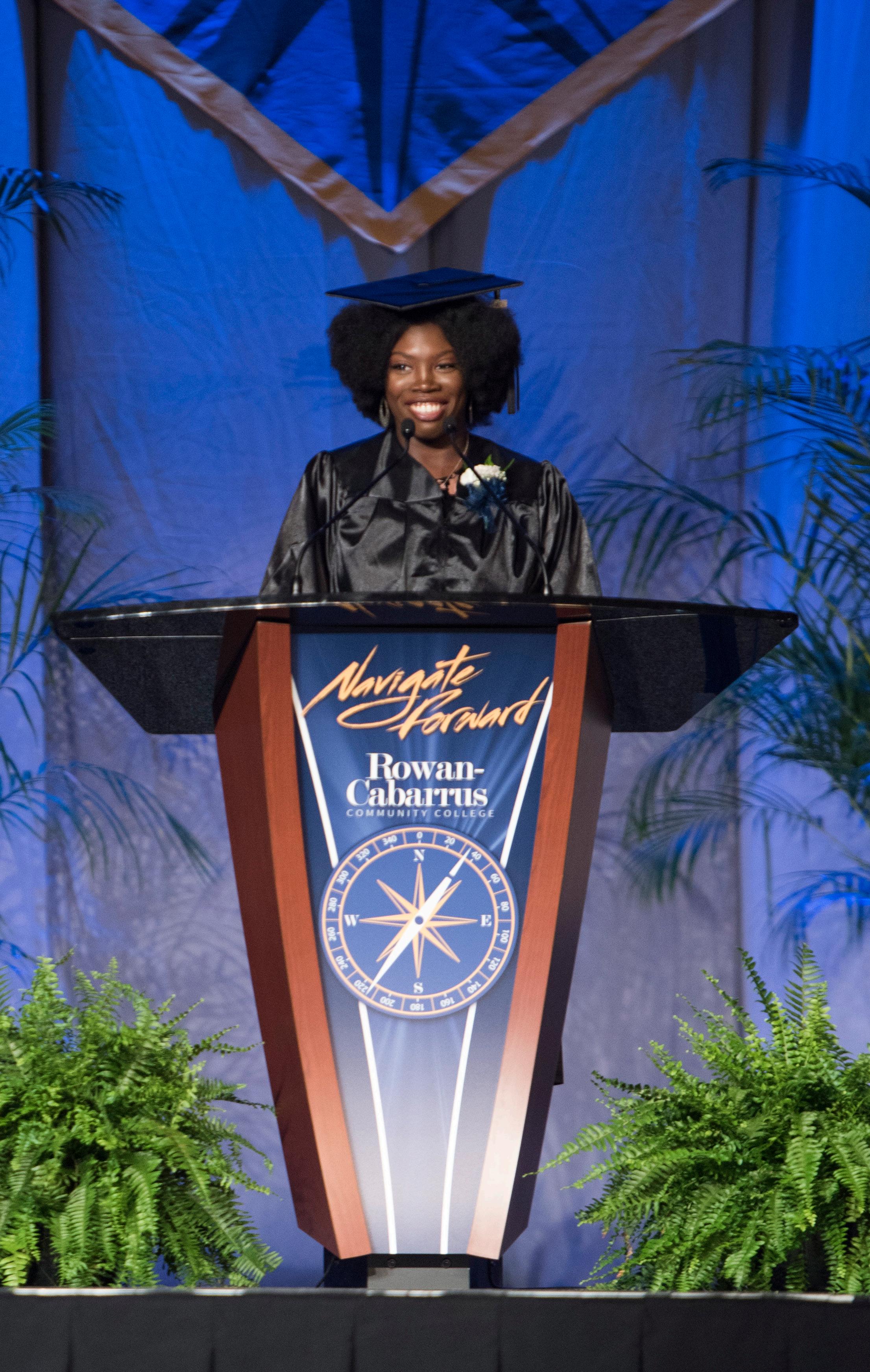 Liana
–
Walker, 2017-2018 Student Government Association president
Liana
–
Walker, 2017-2018 Student Government Association president
embers of the class of 2018 earned more than 1,500 different degrees, diplomas and certificates.
“Your graduation is not the end of your education, even if this is the last time you attend school,” said commencement speaker Susan Kluttz, former mayor of Salisbury and Secretary of Cultural Resources for the state of North Carolina. “It’s the beginning. Life itself is education.”
Kluttz talked about experiences during her tenure as mayor and how each taught her valuable life lessons.
“Some people say you shouldn’t set goals that you never will achieve because it may frustrate you, but I believe you should set goals the very highest you can,” said Kluttz. “Then you work as hard as you can to achieve them, and you celebrate each achievement you make, no matter how small.”
“Education is the best investment anyone can make,” said Dr. Carol S. Spalding, president of RowanCabarrus Community College as she welcomed the class of 2018.



The class of 2018 was the 54th graduating class of Rowan-Cabarrus Community College.

Among the graduates was Liana Walker, president of the Student Government Association at RowanCabarrus, who completed her associate degree and transferred to Appalachian State University to earn her bachelor’s degree in communications.

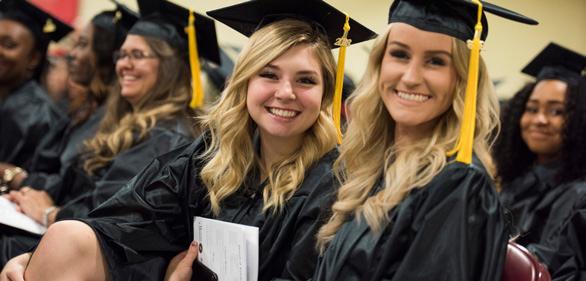
“Liana was elected by her peers as the 2017-2018 Student Government Association president. She has proudly represented Rowan-Cabarrus as a delegate at statewide student government conferences.
As Student Government Association president, Liana’s goal has been to help students see that the possibilities are endless, no matter where they are
in their academic journey,” said Patricia Fulcher, Rowan-Cabarrus Board of Trustees member, as she introduced Walker to the crowd.
Walker told her fellow graduates that as they go on to pursue more education or into the workforce, she hopes they reflect on their time at Rowan-Cabarrus and how it helped them grow.
“For these past two years I have learned how to dance with fear, as I like to call it,” said Walker.
Walker shared how her self-doubt and fears were bigger than her dreams, which caused her to not go for opportunities because of the fear to take a leap of faith.
“If you don’t remember anything I’ve said today, I want to leave you with a few words that have helped me along my journey. Good. Better. Best. Never let it rest ’til your good is better and your better is best,” said Walker.
Technology continues to evolve at a breakneck pace. For advanced manufacturing and other high-tech businesses, keeping up with these trends can be the difference between a company’s continued success or its demise.

Rowan-Cabarrus Community College is committed to partnering with business and industry to ensure that the technology and training needed to keep pace is available and accessible. In 2014, the College successfully passed a bond campaign in Cabarrus County to support the development of a new Advanced Technology Center (ATC).
In 2018, the College was proud to officially break ground and construct a significant portion of the new Advanced Technology Center.
“The Advanced Technology Center will be a flagship to attract employers to the region and will allow the College to bring a higher level of training and education to the community, increasing participation in high-wage jobs,” emphasized President Carol Spalding. “Employment in advanced technology is constantly evolving, and this facility will allow us to ensure that the local workforce remains qualified and
current – key components of economic development.”
The Advanced Technology Center will be a 55,000-square-foot building located across from the College’s very successful biotechnology and health sciences building on the North Carolina Research Campus in Kannapolis.
The ATC will include 12 practical and integrated labs and seven general and computer classrooms. The building will feature a large flex lab on the ground floor, which will allow the College to provide space for industry partners to assist in working through their production line challenges. The building will also have a student lounge and collaboration areas, and a useful lobby. There will be seminar spaces, which will enhance the ability to host community partners as the College currently does in the adjacent North Carolina Research Campus location.
“It is our hope that the Advanced Technology Center is going to be both a place and a culture. It will be a home for innovation, technology, and the excitement that can be felt when ingenuity and creativity are able to thrive,” said Craig Lamb, vice president of corporate & continuing education at Rowan-Cabarrus. “This
building is a sign to our community and companies that this region is committed to developing a workforce to accommodate and support high-tech, advanced technology careers.”

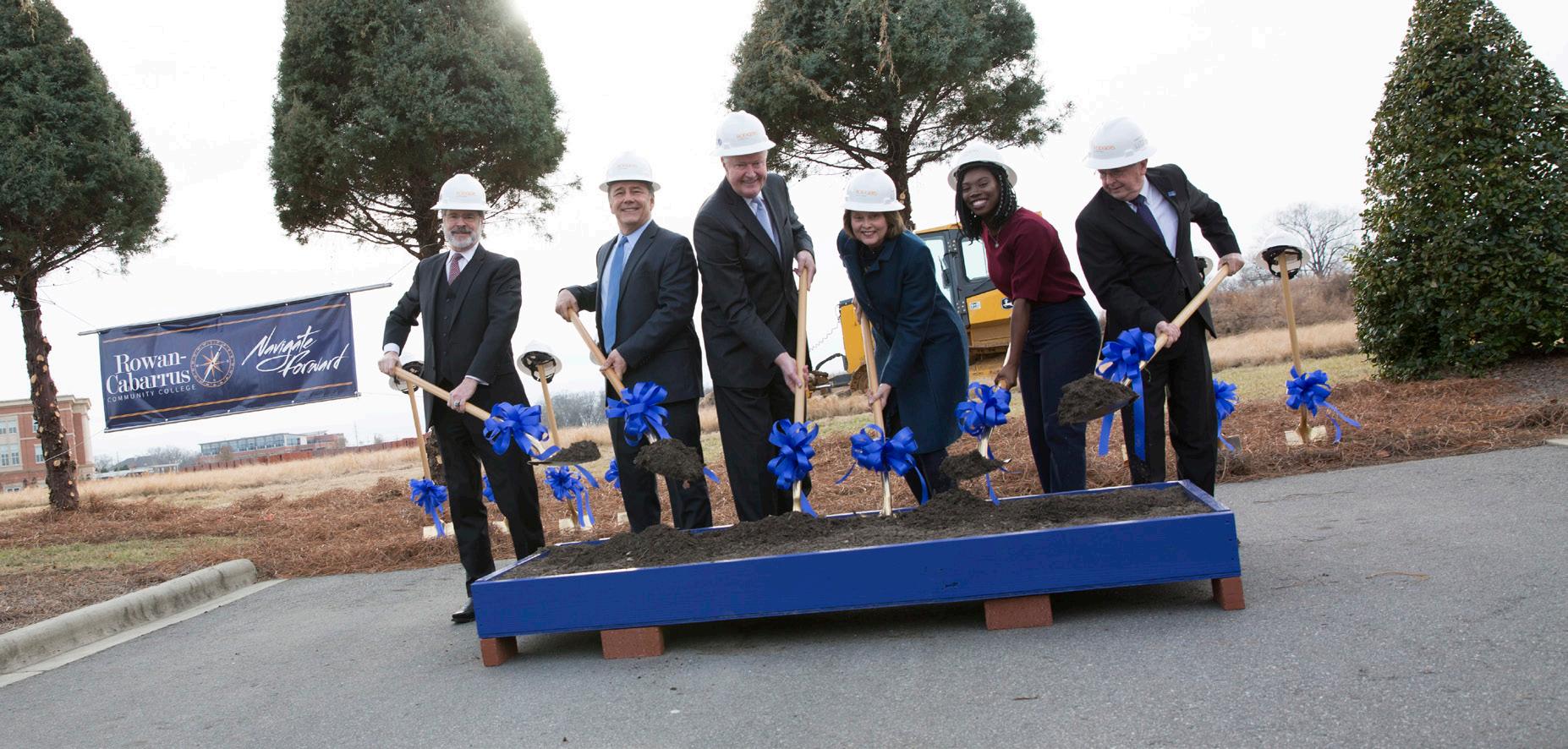

The College plans to anticipate and respond accordingly to future technology changes and has designed the new ATC to support industry growth for the next 50 years. It will offer advanced levels in numerous programs, including the new transferable engineering A.A.S. degree and interdisciplinary projects and capstone experiences for students. Students will work on equipment in the ATC that is currently in the workplace and get hands-on experience to learn and improve their skills.
“We hope to bring together people who are teaching and training to solve comprehensive problems for companies. When a company has a manufacturing issue, we can bring together our skilled instructors to collaboratively solve their problems at the Advanced Technology Center,” said Dr. Michael Quillen, vice president of academic programs. “All of this comes together to provide timely, state-of-the-art training and integrated approaches to solving everyday problems.”
The Advanced Technology Center project is the result of collaborative funding by both private and public partners. The combined efforts and support of the Cabarrus County Bond Referendum ($9 million), Cabarrus County funding ($8 million), the Economic Development Administration ($2 million), and additional funding from the Rowan-Cabarrus Foundation’s Building a More Prosperous Community Major Gifts Campaign make the creation of this new building possible.
The ATC is located on nearly three acres of land generously donated by David Murdock through the collaborative efforts of Vice President of Castle & Cooke North Carolina Operations at North Carolina Research Campus Mark Spitzer, College President Carol Spalding and Kannapolis Mayor Darrell Hinnant.
The new ATC will open in two phases-with the first phase completing 90 percent of the building in August 2019. The second phase, funded by the $2 million grant from the Economic Development Administration, will complete the flex lab space of the building and allow companies to use the space to set up prototype systems and manufacturing lines to expand or enhance their business.

“When looking around this growing area, I know this groundbreaking is more than a literal symbol, but a figurative representation of a better tomorrow. This building is not just an investment in the students, but also in the community.”
– Liana Walker, 2017-2018 Student Government Association president
“What started out as a financial need to get a job turned into a life-changing, leadership development, career-building journey that literally has transformed our family’s future.”
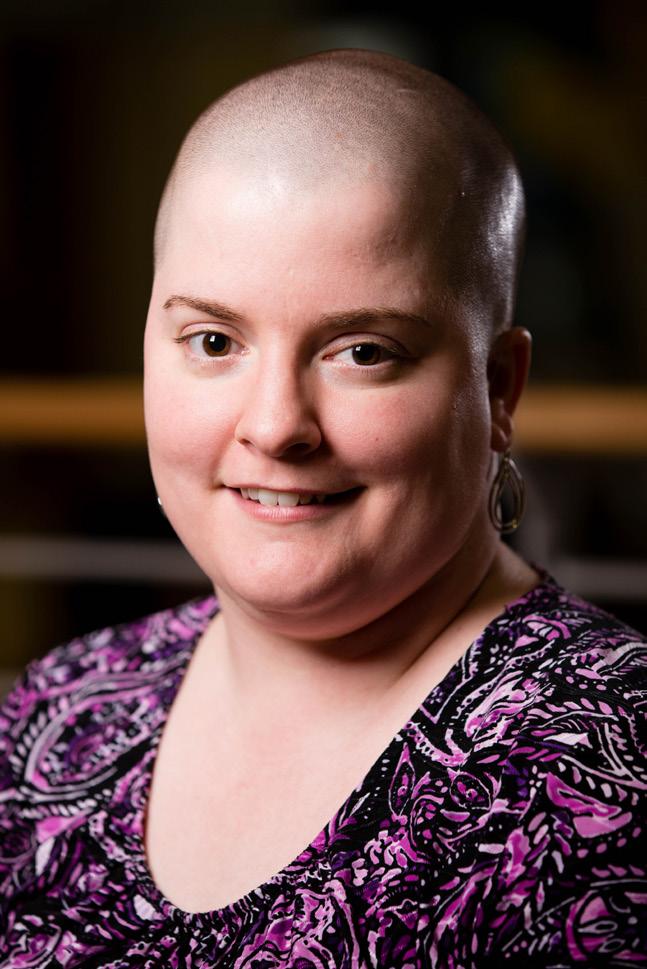




 – Mark Hill, 2018 Rowan-Cabarrus Community College graduate
– Mark Hill, 2018 Rowan-Cabarrus Community College graduate
While grades might measure the experiences students have inside the classroom, the knowledge, skills, experiences and transformations that happen outside of the classroom are often the most profound.
“Even though students come to us to earn a degree, they often acquire much of their new knowledge outside of the classroom. Our ever-expanding set of extracurricular activities creates a holistic student experience, developing leaders and helping students engage in their community,” said Barb Meidl, director of student life and leadership development.
The College provides opportunities for groups of students to learn together and compete on the regional, state and national levels. And compete they do. Annually, the College comes home with multiple awards.
This year, not just one, but two Rowan-Cabarrus Community College students became the top students in the country at the annual SkillsUSA National Leadership and Skills Conference in Louisville, Kentucky. Ashton White was awarded the National Championship in Masonry, and Heidi Swinson was awarded the National Championship in Dental Assisting.
“We are so proud of our first place winners! What an accomplishment to train in your field and then compete, ranking number one across the entire country,” said President Spalding.
Annually, the College has the opportunity to select the Student Excellence Award winners to recognize the most outstanding leaders across the College.
“These finalists represent the best and brightest of Rowan-Cabarrus Community College,” said President Spalding. “We could not be more proud to recognize these students whose outstanding accomplishments reflect the core values of our college.”
The finalists were up for three prestigious awards. Mark Hill received the Academic Excellence Award, which recognizes the academic achievement, leadership and community service of one student from each of the 58 institutions in the North Carolina Community College System.
“What started out as a financial need to get a job turned into a life-changing, leadership development, career-building journey that literally has transformed our family’s future,” said Hill, who maintained a 4.0 GPA while earning his two engineering degrees and interning, where he was hired full-time after graduation.
Mai Ha was awarded the Governor Robert W. Scott Student Leadership Award. The award is named in honor of Robert W. Scott, who served as N.C. State Governor from 1969-1973 and as president of the North Carolina Community College System from 1983-1995.
“Mai has come to call Rowan-Cabarrus her saving grace. As a young mom, she struggled to achieve her dreams while balancing her role as a mom. With hard work and perseverance, Mai also took advantage of numerous leadership opportunities,” said Steve Morris, member of the Rowan-Cabarrus Community College Board of Trustees and chair of the Cabarrus County Board of Commissioners.
Sarah Bosse was awarded the Dallas Herring Achievement Award. Dr. Herring, a Duplin County native, is acknowledged as the philosophical godfather of the state’s community college system. He may be best known for his belief that education should be available to all and that community colleges should “….take people from where they are, to as far as they can go.”
Sarah had to give up multiple careers she loved due to her health challenges. She’ll tell you herself that she has experienced her share of failure. However, she is not giving up: she is re-imagining her life.
“By achieving my dream, I may not end world hunger or find a cure for a disease; but I will have made a difference, created some smiles, solved some problems, and hopefully restored some of our faith in humanity and God that we desperately need as a society,” said Bosse.
Technology is best appreciated when it enhances the student’s learning experience and adds value to a presentation. Rowan-Cabarrus Community College has embraced the need for technology to support our mission and help students, faculty and staff work smarter, not harder.
Rowan-Cabarrus Community College was pleased to take fourth place in this year’s 2017-2018 Digital Community Colleges Top Ten-Ranking Survey, conducted by the Center for Digital Education. While Rowan-Cabarrus has held a spot in the top ten for the last four years in a row, this is the first time that the College has been the leading institution in North Carolina.
The College faced fierce competition as all accredited U.S. community colleges are eligible to participate in the Digital Community Colleges Survey within three classifications based on enrollment size. RowanCabarrus was recognized for its work on mobile technology, smart classrooms, and technology innovation.
“We are extremely proud to have made this prestigious list of honorees for the last four consecutive years, and to have maintained our fourth place ranking this year!” said President Spalding. Rowan-Cabarrus utilizes digital technology to enhance and improve the quality of services provided. The College offers technology resources like online tutoring for students 24 hours a day, seven days a week, new registration features that allow students to plan their entire academic path to graduation through the WebAdvisor online help tool, and continues efforts to expand courses offered via
distance education.
“The College understands that technology is the way of the future and calls for greater incorporation in academic intuitions. We will continue to listen to our students and provide the technological options they are seeking for their education,” said President Spalding. “Although we have come a long way, we continue to work and enhance the services and system we provide to students.”
For example, the College is currently working on a new online student advising tool called Navigate that will assist students with staying connected to their personal career and advising specialist throughout their academic journey. This planning helps improve a student’s ability to forecast the classes they need to take each term and how close they are to achieving their degree, diploma, or certificate.
The College also supports a Bring Your Own Device (BYOD) approach to technology on campus and assists students, faculty and staff with the College’s IT help desk. Rowan-Cabarrus has created a stable, secure wireless network that allows students, faculty, and staff to be able to connect to network resources using not only college-owned devices but personal devices like smartphones, tablets or laptops.
“Some schools utilize the BYOD approach by offering low-end computers for purchase. We want to ensure our students receive fully functional, high quality computers at a fraction of the cost. We also are able to assist students in using their financial aid to make the purchase, ensuring that individuals have the access to technology that they need,” said Ken Ingle, chief officer of information services for the College.
The College not only supports enhanced websites, new online planning systems, mobile technology, campus wide wireless access, as well as many other tools, but Rowan-Cabarrus ties all of these items together to create a cohesive personalized and contextual experience for students.
“A recent study indicated that distance education enrollments account for nearly all recent student growth at two-year institutions, and we want to be sure we are offering courses in the methods our students want. However, from the information technology side of things, we also want to make sure those offerings are supported with the right kinds of technology and customer service resources,” said Ingle.
The College also offers several programs 100 percent online, including the transferable Associate in Arts and Associate in Science degree options. In addition, dozens of diplomas and certifications are available to be earned entirely online.
Other digital initiatives include introducing online textbooks to many of the College’s core and elective classes, online job preparation and searching resources, social media and electronic emergency notifications systems.


“We are proud to partner with Rowan-Cabarrus Community College to connect students with apprenticeship and workforce training opportunities,” said Randy Welch, Duke Energy district manager. “These students will help meet the growing and evolving needs of the region’s manufacturing industry.”
The “skills gap” affecting the manufacturing industry has been a topic of conversation for some time, but has soared even higher in the years since the 2008 recession. As a result, manufacturers are facing difficulties filling open positions due to a lack of qualified and skilled applicants. The College has been committed to addressing this gap for these high-tech, high-wage jobs.
One way that the College is doing that is with the help of a $560,000 grant from the Golden LEAF Foundation to develop a new mechatronics program and upgrade equipment for the welding program in Rowan County.
Mechatronics originated from advanced manufacturing. Mechatronics engineers work to automate the transfer of materials and goods in the manufacturing process. Additionally, mechatronics engineers are well-compensated for their work with an average compensation range from $64,000-$96,000, based on tenure level.

“We are grateful to Golden LEAF for their continued support of our community’s workforce development needs and appreciate this vote of confidence in our ability to deliver critical advanced manufacturing training,” said President Spalding.
The new Mechatronics Engineering Technology program at Rowan-Cabarrus prepares students for jobs requiring electrical, mechanical, and computer skills necessary to work on complex systems found in advanced manufacturing environments. The program combines theory and hands-on education.
The new mechatronics lab includes technology and robotics to support distributing, testing, processing, handling, buffering, purchasing, sorting, and assembling. Students will learn not only why something works but how to put that theory into practice. In 2019, the College will introduce a pathway for high school students to take courses toward a

certification in mechatronics while still completing their high school diploma.
Also in 2018, Rowan-Cabarrus continued to enhance and expand its new four-year apprenticeship training program.
“We started this program because companies need more multi-craft maintenance technicians who have a mastery of all required job duties, but most of our local companies do not have the critical mass to run an apprenticeship program,” said Tashina Mahatha, account manager in business services at RowanCabarrus. “By the College taking on the administrative functions, this allows companies to join a collective of manufacturing companies to ensure that their apprentices get the training they need when they need it.”
However, the costs for this program were not insignificant for local employers. The training costs associated with the apprenticeship is estimated to be $3,500 – $5,000 for the four-year program, which includes the cost of books.
Thanks to the Duke Energy Foundation generously providing a $200,000 grant to support the Multi-Craft Maintenance Technician Apprenticeship program, the apprenticeship program is now generously funding all tuition, book and material costs for each apprentice over the next four years. In addition, the grant allocated money to purchase new equipment and related supplies that will be housed in the College’s new Advanced Technology Center in Kannapolis, which is slated to open at the end of 2019.
Currently, Rowan-Cabarrus is partnering with local companies, including Trelleborg Boots North America Inc. and Carolina Color Corporation, to provide apprenticeship training over the next four years for employees to become multi-craft certified. Their employees will participate in theoretical instruction and 2,000 hours of on-the-job-training simultaneously.
“We are grateful to Duke Energy and Piedmont Natural Gas for their continued support of our community’s workforce development needs and appreciate this vote of confidence in our ability to develop this unique apprenticeship program,” said President Spalding. “Without investments like this, it would be difficult for small businesses to fund their own apprenticeships
and this will make it much more accessible for them.”
The program is slated to support 42 local individuals over the four-year grant period.
The North Carolina Manufacturing Institute is also continuing to grow and expand. With nearly 50 local manufacturers on board, the job opportunities for those interested are practically limitless.
Graduates with little-to-no manufacturing experience are securing employment by transforming themselves into career-ready manufacturing professionals through this no-cost eight-week training program. As part of the North Carolina Manufacturing Institute initiative, they gain knowledge and skills in safety, quality assurance, manufacturing processes and maintenance awareness.
“I absolutely love my job and can honestly say I never would have gotten a job like this if I hadn’t received the NC Manufacturing Institute scholarship and gone through the training program,” said Chris McDonald, graduate of the NC Manufacturing Institute. “My work is satisfying. I have a real career now. I’m getting paid vacations for the first time in my life, not to mention that I’m saving a lot of money on gas because the plant is only five minutes from my house!”
Those who have not considered manufacturing as a viable career option or those with no experience in the field should not be deterred from pursuing the program.

“While we hear a lot about low unemployment, many of us know people who are still piecing together multiple part-time jobs or who are desperately searching for a good job,” said Craig Lamb, vice president of corporate and continuing education at Rowan-Cabarrus. “This program is for anyone who wants a quality full-time job with full benefits – it doesn’t matter what your background is, it matters what your future is.”
There are well-paying jobs in manufacturing available right here in Rowan and Cabarrus counties. In fact, almost 90 percent of graduates find full-time employment within one month of graduating.

As the largest provider of public safety training in the state of North Carolina, Rowan-Cabarrus is proud of the commitment the College has made to this important life-saving field.
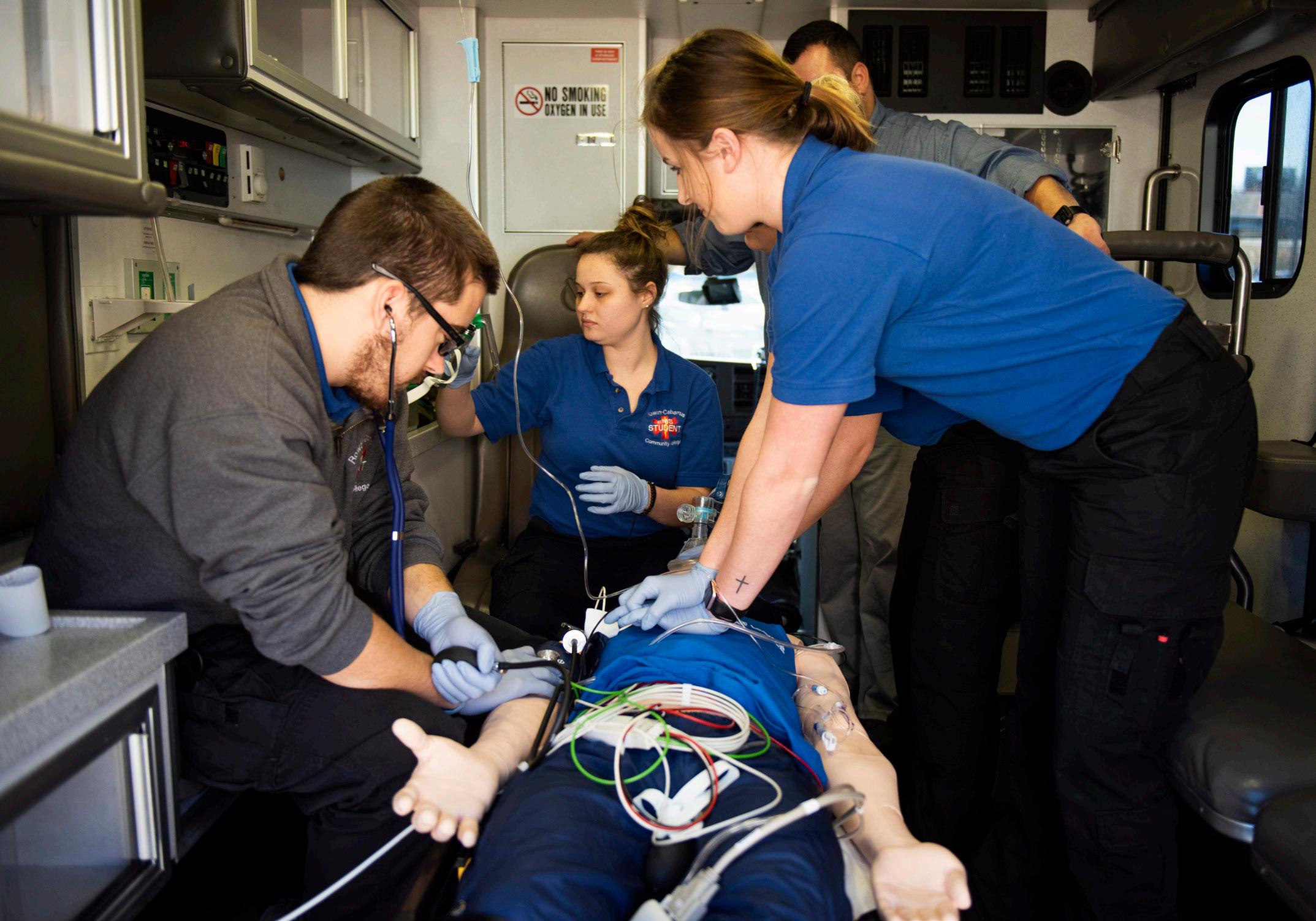
In the last several years, the College has continued to enhance and expand its offerings, classes, and training facilities.
The public safety programs at Rowan-Cabarrus have always been popular, but investments in recent years have helped the programs continue to grow and serve the training needs of Rowan and Cabarrus counties. In 2014, the Fire & Emergency Services Training Facility was the first project to be completed in a series of Rowan County bond-funded construction projects. The facility serves an important role for training local public safety providers who protect citizens every day.
The completion of the Fire & Emergency Training Facility on North Campus was just the first in a long line of enhancements, including the development of a training facility at South Campus in Concord.
“We are excited about the prospects for training on this new property. The new equipment and the facility combined make a perfect pair for us to take our
training to the next level,” said Chris Nesbitt, director of the College’s Basic Law Enforcement Training (BLET) and chair of the Criminal Justice Technology program.
The purchase of a mobile driving simulator and the development of a new training tower are other examples of the College and community’s investment in the training. However, the most important investment is in the form of the award-winning leadership at the helm of these programs. The longstanding leader of the College’s Fire & Emergency Services training program, Roger McDaniel, was recognized by the prestigious North Carolina Association of Fire Chiefs.
“We have the largest fire and rescue program in the state thanks to Roger McDaniel. He sees opportunity everywhere,” said Craig Lamb, vice president for corporate and continuing education. “For instance, over the last five years when the annual fire chiefs have come to Concord for their conference, Roger and his team put on 26 different courses over three days, enrolling 1,029 individuals.”
The training facility includes a 3,500-square-foot
burn building, training pads for props, driver training services, flashover chamber, two rail props, fire extinguisher station, retention pond, mobile classroom and office, and extrication props.
The College is the also the local provider for those just starting out in the public safety field. These programs include rookie school for firefighters, Basic Law Enforcement Training (BLET) for new law enforcement professionals, and training for Emergency Medical Technicians (EMTs).
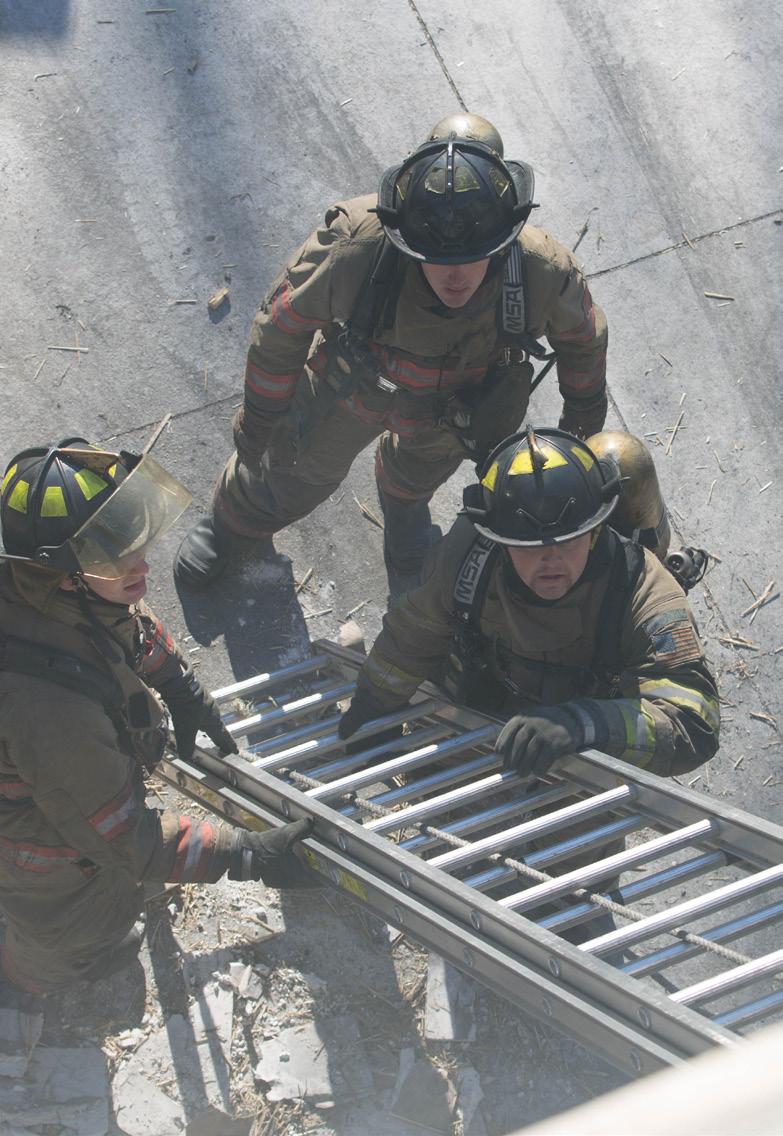
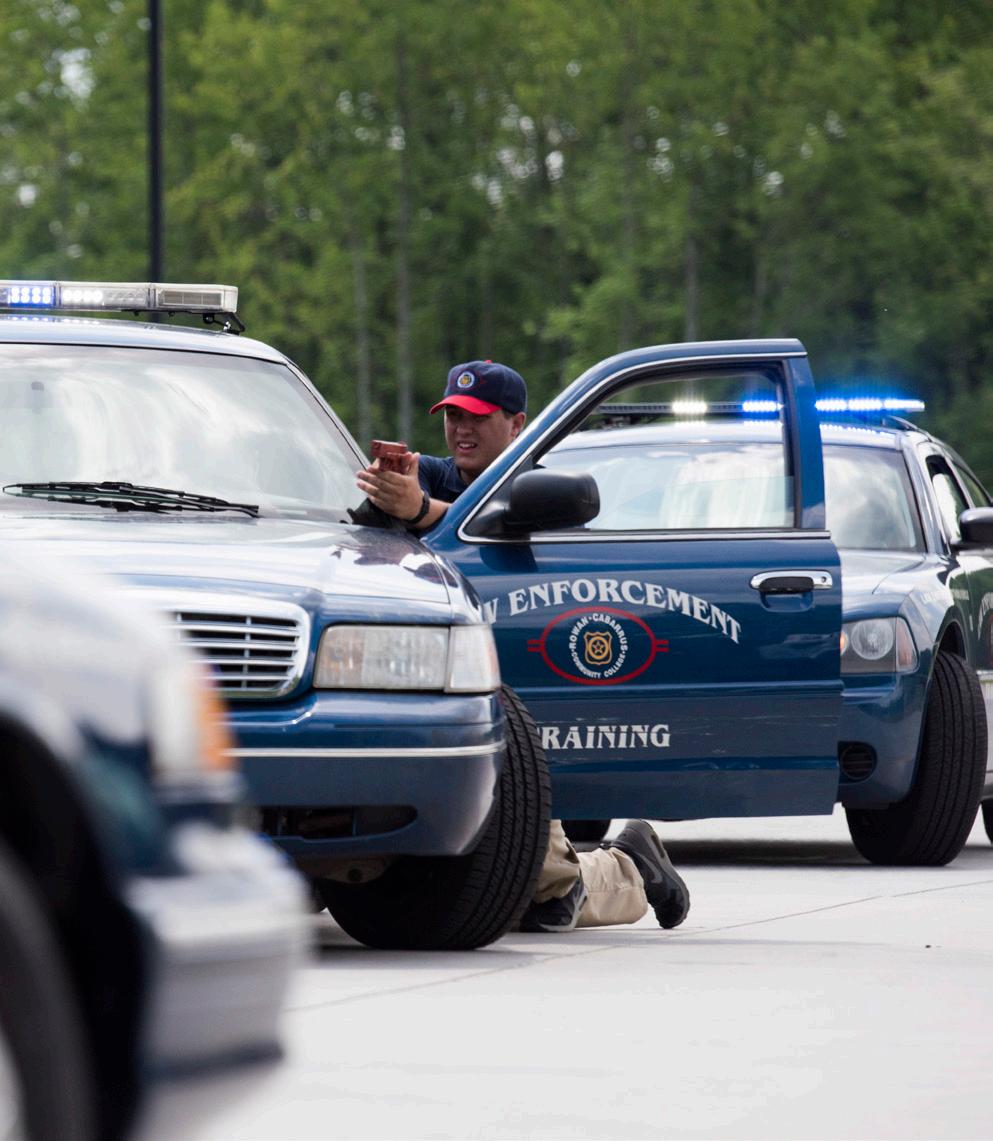
The College is recognized across the state for developing and offering cutting-edge continuing education training for those already firmly in their career in public service.
“We have been paying special attention to how we can grow and enhance our continuing education classes. We want to be sure that we are helping today’s law enforcement professionals deal with the ever-changing world that we live in,” said Lamb.
One way that the College recently did this was by hosting an innovative symposium, the first ever law enforcement symposium on victim and witness intellectual disability training. To date, there has been little to no training for officers on how to conduct interviews with individuals with intellectual
disabilities and addressing an unfilled need for these vital skills prompted Rowan-Cabarrus to create something from scratch. Although these individuals are rarely the offenders, many times they are victims and witnesses.
“When there is a need within our community going unaddressed, the College feels we should step up and respond accordingly to meet that need and support the communities we serve,” said President Spalding. “We have designed a training session that will be beneficial and encourage greater public safety for all citizens within the Rowan-Cabarrus community.”
Finally, Rowan-Cabarrus is also well-known in the community for providing pathways for individuals to continue to grow in their career. For instance, the paramedic bridge program is designed to give currently certified paramedics a path toward a higher paying job with an Associate in Applied Science in Emergency Medical Science.
“It provides the student an opportunity to gain complex knowledge and competency in the field of Emergency Medical Science and also provides the student with specialized training in management to prepare the student for career advancement,” said Alan Thompson, chair of the program.

“We all care tremendously about having educated, talented individuals caring for us and those that we love. Ensuring that our nurses are ready to excel in their chosen career is of the utmost importance.”


– Dr. Wendy Barnhardt, dean of health and education programs
s the healthcare field continues to evolve and present new employment opportunities, RowanCabarrus has responded, anticipating trends and expanding healthcare education programs. By offering training in fields with the most demand, the College makes a difference for both our students and the communities we serve.
The College has launched a new physical therapist assistant (PTA) program, continues to build its occupational therapy assistant (OTA) program, and is expanding its nursing program to meet the needs of our communities.

“We all care tremendously about having educated, talented individuals caring for us and those that we love,” said Dr. Wendy Barnhardt, dean of health and education programs.
The physical therapist assistant program is the newest offering. The program received their “Candidate for Accreditation” status on November 14, 2018, which granted them permission to start the program in January 2019. The program integrates a variety of instructional methods to equip students to work under the supervision of a licensed physical therapist, helping patients improve mobility, relieve pain, limit disability, and promote overall wellness.

Another new program to Rowan-Cabarrus is the occupational therapy assistant program. This curriculum prepares individuals to work under the supervision of a registered/licensed occupational therapist in screening, assessing, planning, and implementing treatment and documenting progress for clients receiving occupational therapy services.
“Occupational therapy assistants help patients of all ages and with all different types of disabilities and challenges to participate in everyday life activities. They are patient, reliable and compassionate individuals,” said Amy Mahle, program chair of the OTA program.
The College’s largest healthcare program, nursing, consists of an associate degree in nursing (ADN) and licensed practical nursing (PN). The nursing programs have a well-documented track record of success in both student performance and program recognition. The ADN program is one of only 21 programs among the 58 community colleges
in North Carolina that is nationally accredited by the Accreditation Commission for Education in Nursing, while the PN program is only one of six across the entire state – out of 39 programs – to receive accreditation.
“The prestigious nursing program supports our local healthcare industry in an important and very real way,” said Carl M. Short, Jr., chair of the RowanCabarrus Board of Trustees. “We are extremely proud of the nursing program’s excellence and the service our nurses provide to our community.”
Although start-up costs for space, faculty, curriculum development and equipment are high, the College receives no additional funding to develop new programs and must seek creative solutions. These include private philanthropic investments, including The Leon Levine Foundation’s offer of $300,000 in matching funds from the College’s Foundation for healthcare education if the Foundation’s major gifts campaign met its goal. The campaign reached its $1.2 million healthcare education goal, thanks to the generosity of numerous community members and organizations, including Novant Health and the Rowan County Commission.
“We are grateful for the support of our community partners to enable us to provide these important programs,” said President Spalding. “We are providing the best possible training to ensure that our communities enjoy the highest quality of healthcare.”
tudent scholarship winners say they are humbled to think that a complete stranger would care enough to open their wallets and “pay it forward,” and they are forever grateful to these quiet champions who make it possible for them to change their lives for the better. As nearly 450 guests and scholarship recipients gathered at the annual Rowan-Cabarrus Community College Foundation Changing Lives Scholarship Luncheon, scholarship recipients had the chance to personally thank those who assisted them. Liana Walker, 2017-2018 Student Government Association president and an associate in arts transfer student, shared how being the daughter of a single mother motivated her to apply for scholarships.
“If you don’t go after what you want, you’ll never have it. If you don’t ask, the answer is always no. If you don’t step forward, you’re always in the same place,” Walker said, quoting author Nora Roberts. “As students, we ask the Foundation for help and, in turn, they look to us to rise to the occasion, no matter the obstacles, because success is bigger than failure.”
Jacob Mohammad, an associate in general education pre-health nursing student and Rowan-Cabarrus Student Ambassador, knows firsthand the impact a caring nurse can have. “I was only two years old when I was diagnosed with leukemia. The nurses helped me when I was at my lowest, and they made all the difference. I cannot wait to do that for others,” Mohammad said.
Scholarship recipients Whitney Brown and Brian McGuire shared their own touching stories via a prepared video.
“Within three weeks of my separation from my husband, I found out that I got a scholarship that covered everything,” said Brown, a nursing student. “Coming to Rowan-Cabarrus Community College has been the best experience ever.”
The film also highlighted Susan and Bob Smith, longtime, generous supporters of the College.
They were featured along with Brian McGuire, recipient of the Susan J. and Robert M. Smith Endowed Scholarship.
McGuire, a veteran and former ranger in the U.S. Army, lost both of his legs below the knee during his fourth tour of duty in Iraq and Afghanistan. The scholarship enabled him to make a career change for a brighter future for himself and his family.
“Coming to Rowan-Cabarrus Community College and getting into the Computer-Integrated Machining program is moving towards that next level of learning a new career, learning a new field, and hopefully moving forward and thriving in it,” said McGuire. By investing in Rowan-Cabarrus students, scholarship donors are investing in their neighbors and community. Students live, work, raise their families and spend their incomes in our region.
“Through all of this economic uncertainty, I believe there is hope,” said President Spalding. “Our region’s potential is too important to leave to chance. We must align strategic investments and resources to ensure that we influence and mold a future that provides hope and opportunity for our citizens.”
In total, the Rowan-Cabarrus Foundation raised more than $100,000 at the Changing Lives Scholarship Luncheon to support new and existing scholarships and student emergency needs.
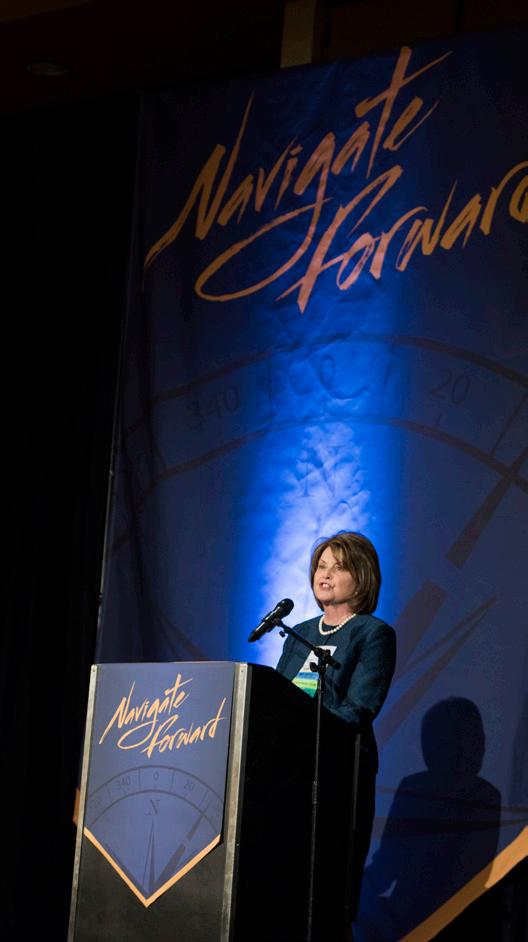
The Rowan-Cabarrus Foundation has a twenty-seven member Board of Directors, nine committees, and a multitude of volunteers. The Rowan-Cabarrus Foundation provides funding for:
• Student assistance (scholarships, emergency funding and books)
• Institutional enhancement (capital improvements, equipment, program, and curriculum support)
• Faculty/staff incentive grants and continuing education
• New program development


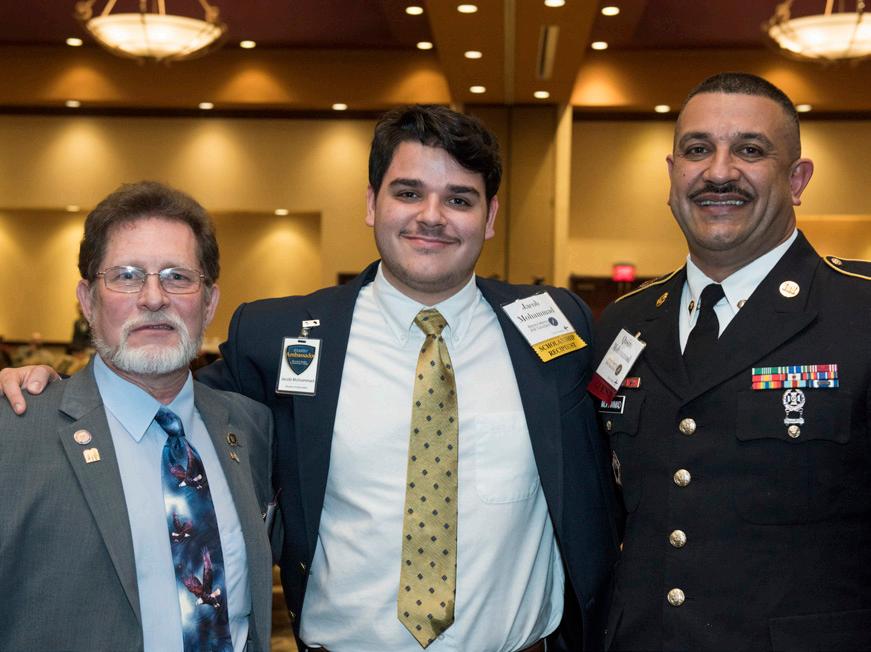

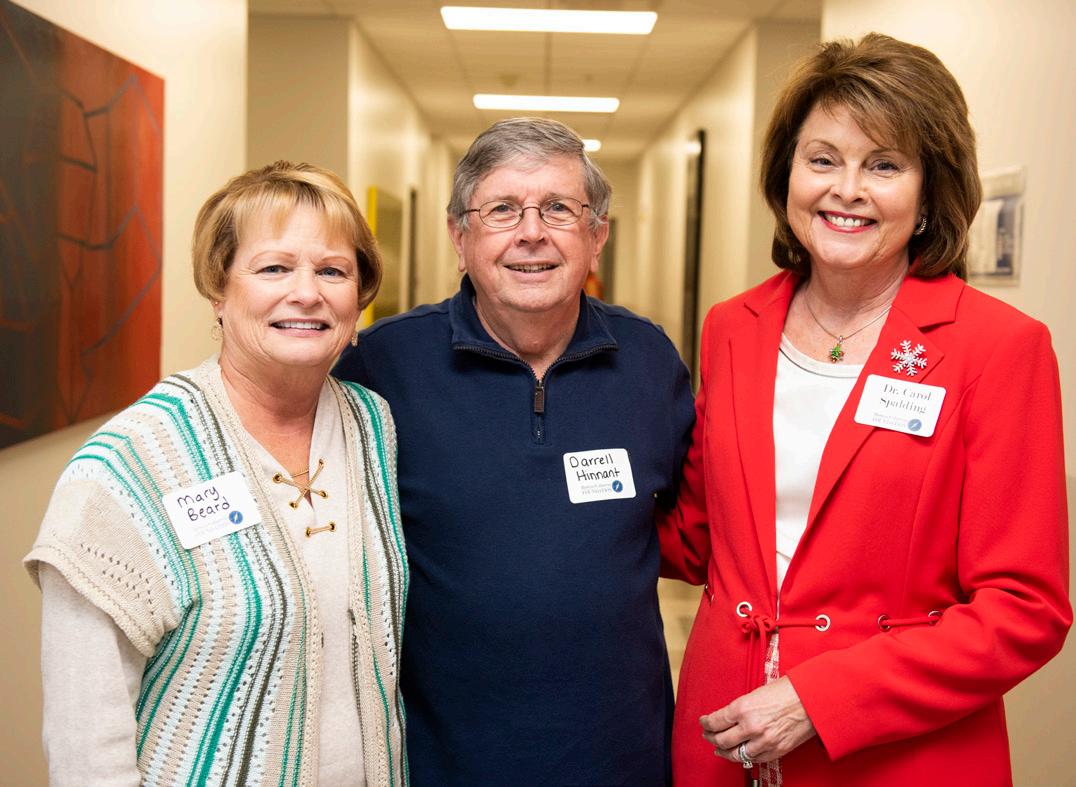

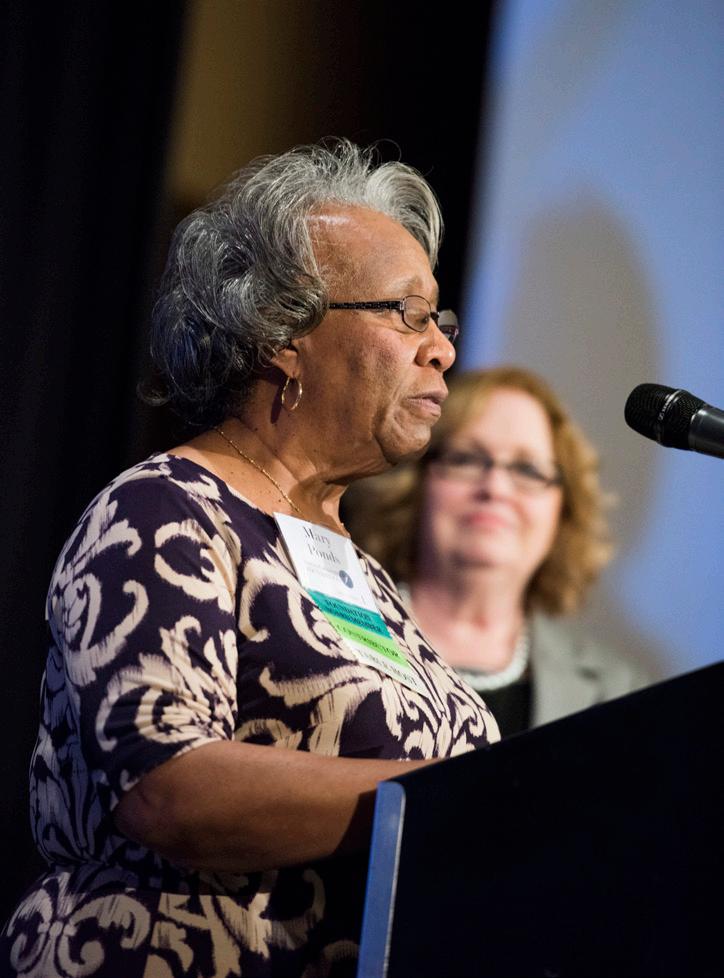



“Our students live, work, raise their families, and spend their incomes in our region. An investment in Rowan-Cabarrus Community College is an investment in your neighbors and your community.”
– Paul Brown, a member of the Board of Directors of the Rowan-Cabarrus Community College Foundation
Over the last several years, Rowan-Cabarrus Community College’s Foundation has undergone a significant transformation.
The College has been the recipient of extraordinary generosity from many individuals and companies in the local region. However, the largest source of that generosity, by far, came this year from local philanthropists Fred and Alice Stanback.
As a part of the College’s recent major gifts campaign and in alignment with its sustainability mission, the College was awarded its largest gift to date through the generosity of Fred and Alice Stanback. The milliondollar gift from the Stanbacks funded the College’s first solar energy project covering two of the College’s five rooftops.
Then, to impact the 2017 fall semester, the Stanbacks made a second major donation of $2.68 million – the largest gift ever made to the Rowan-Cabarrus Community College Foundation from an individual. This generous gift will fund scholarships and additional solar energy projects that will include a learning opportunity for students.
“This is more than a sustainable solar voltaic system. Once connected, the income from the energy produced will create an income stream for the College’s Foundation that will provide funding for faculty and staff professional development and student scholarships for years to come,” said President Spalding. “This is truly the gift that will keep on giving.”
The combined systems will generate roughly 2,000,000 kWh of clean energy per year. The College is working closely with Duke Energy to complete the solar energy connection and power purchase agreement, which will generate a projected annual revenue to the Rowan-Cabarrus Foundation of approximately $80,000 to $100,000 for student scholarships and sustainability investments.
Upon completion of the systems at the College’s North Campus, they will provide energy equivalent to power 200 homes for a year, and avoid the introduction of roughly 2,000 tons of carbon dioxide into the atmosphere. This will be the largest solar system at any of North Carolina’s community colleges.
“As a public higher educational institution, we are especially thankful to have private community support from donors. When our students receive scholarships, they consistently tell us that it’s not just about the money – it also means that someone has faith in them,” said President Spalding. “I now think I understand that sentiment in a new way. The gifts from the Stanbacks, along with those from the other donors named on our donor recognition plaque, are assurance that the community has faith in the work we are doing and believe the College is a great investment. What a great feeling!”
The scholarships will be awarded to Rowan County residents.
“I’m just glad we could help,” said Fred Stanback at the recognition event. There are many students who want to attend Rowan-Cabarrus who do not make enough money to pay for college, but make too much to qualify for federal financial aid.
“Thanks to this investment from the Stanbacks, more scholarships will provide hope and opportunity for students who may not otherwise have the financial ability to accomplish their educational and career goals,” said Carl M. Short, chair of the Rowan-Cabarrus Board of Trustees. “A year of education at Rowan-Cabarrus is a great value at about $3,000 per full-time student for tuition, books and fees. However, not everyone has the means to pay this. These scholarships will make it possible.”
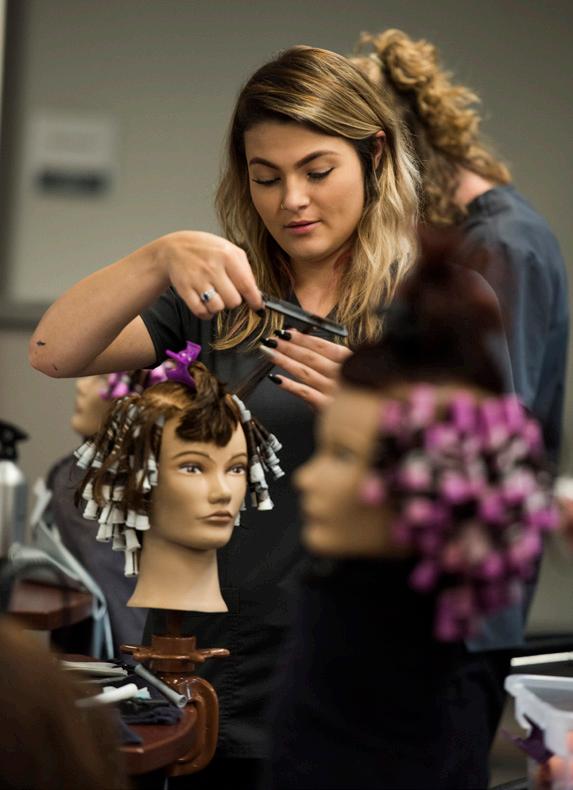




lready one of the largest and most successful in the state, the Rowan-Cabarrus cosmetology, esthetics and manicuring programs rose to even greater heights with their move to a spacious new location in Kannapolis called College Station.

The previous location on West Avenue was a key site in the City of Kannapolis’ plan to build a new stadium downtown. In order for the city to move forward, Rowan-Cabarrus partnered with Kannapolis, Cabarrus County and Castle & Cooke to relocate the cosmetology program to the shopping center at 489 Cannon Boulevard.
When the site was ready, the College hosted city and county officials, the Rowan-Cabarrus Board of Trustees, faculty, staff, donors and community members for a ribbon-cutting ceremony and tour of the new location, named College Station. Students showed off their accomplishments as they worked with models to do hair, makeup and nail treatments for an entertaining runway show.
The new building provides more square footage, a professional lobby area, full-service salon labs, a computer lab and classroom space, all on a single level. It is also situated along a Kannapolis bus route for the convenience of students, staff and clients.
“We are proud of College Station and the high level of teaching and learning that goes on there,” said President Spalding. “It is a delight to see students working closely with their instructors and providing high-quality, professional services to clients.”
The program curriculum is designed to provide competency-based knowledge, scientific and artistic principles, and hands-on fundamentals in all three major disciplines of the beauty industry –cosmetology, esthetics and nail technology – all at affordable tuition rates. Students learn in a simulated salon environment that enables them to develop essential manipulative skills.
The program offers associate degrees, diplomas and certificates. Course work includes instruction in all phases of professional imaging, hair design, chemical processes, skin care, nail care, multicultural practices, business and computer principles, and product knowledge. Graduates of the program are eligible to sit for the North Carolina State Board of Cosmetic
Arts examination to receive their license, and then may work in beauty salons or a variety of other professional settings.
“Our students are flourishing in this environment,” said Ronald Wolfe, program chair. “The new facility has windows in each classroom and skylights that provide much-needed lighting for our students, clients and faculty. This is a tremendous help when working with hair coloring.”
At College Station, students offer public clients services at reduced rates, while supervised by licensed instructors. Choices include haircuts, styling, color and highlights, hair treatments, manicures, pedicures, waxing, facials and more.
“Our students are doing beautiful work,” Wolfe said. “I highly encourage anyone to come and enjoy one of the many salon-quality services we offer.”
Since Rowan-Cabarrus began offering classes and seeing clients at College Station, the spacious facility has proven to be a showcase for the transformations and beauty students create for their clients.
“This beautiful facility would not have been possible without the unique public-private partnerships between the City of Kannapolis, Cabarrus County and Castle & Cooke. We are excited about the space and look forward to continued partnerships with these and other community groups,” said President Spalding. “We are extremely supportive of the efforts to revitalize downtown Kannapolis and stimulate economic growth and development. We believe this move is a winwin for both the College and the City of Kannapolis.”

Cabarrus is one of the fastest-growing counties in North Carolina. As the county’s community college, Rowan-Cabarrus is committed to keeping up with the critical demands and needs of the county’s workforce development. In 2018, the College’s partnerships with Cabarrus County were significant and important for moving this workforce development forward.
Rowan-Cabarrus partnered with Cabarrus County to prepare for the future by expanding two Concord campus locations.
For several years, the College has been pursuing additional property to add to the acreage at South Campus, which is located at exit 55 off I-85. Dr. Carol S. Spalding, president of Rowan-Cabarrus, worked with Cabarrus County manager Mike Downs to negotiate the purchase of three pieces of property, two of which are owned by the College, totaling 25.31 acres, located near the College’s South Campus on Trinity Church Road.
“The College has long recognized the need to keep pace with the growing needs of its communities, especially in Cabarrus County where the population is growing quickly,” said Carl M. Short, chair of the Rowan-Cabarrus Community College Board of Trustees. “Rowan-Cabarrus and its leadership continue to impress us with their resourcefulness and ability to creatively solve problems.”
South Campus currently sits on 23 acres and these properties, which are located directly across Trinity Church Road, were identified as desirable land in an evaluation of potential growth of the College’s facilities in Cabarrus County. The Rowan-Cabarrus Board of Trustees reviewed the information and recommended that the board approve the contract to purchase two parcels of land totaling 16.44 acres near South Campus from Crown Court, LLC.
Additionally, Cabarrus County purchased a third parcel of property adjacent to the two Crown Court Properties, totaling 8.87 acres with a purchase price of $1,241,800.
“We have wanted to expand our South Campus location for years now, since it has always been only a fraction of the size of our North Campus in Salisbury. This additional acreage will accommodate the growth in Cabarrus County and the College’s future over the next three decades,” said President Spalding.
Rowan-Cabarrus Community College’s South Campus has also recently undergone several renovations in addition to this expansion project. The South Campus Student Center in Building 3000 was recently renovated in addition to the renovation of the College’s new campus store in Building 1000. Also, a newly installed electric vehicle charging station was recently completed at South Campus, and it is located in the Building 2000 parking lot area.
Additionally, Rowan-Cabarrus, in partnership with Cabarrus County, purchased the former Webster Radiator & AC shop at 650 Concord Parkway, North. This facility, directly adjacent to the Cabarrus Business & Technology Center (CBTC), gives the College both additional space and frontage along Concord Parkway.
The new space, nearly 7,000 square feet, will require renovation to upfit the facility to standards suitable for the new programs. Thanks to support from local voters, the Connect NC Bond awarded to the College in March 2016 provided approximately $486,000 for the renovation of existing space to house a newly developed light duty diesel program.
The new light duty diesel program launched in the fall of 2018, thanks to support from the Golden LEAF Foundation in the form of a $403,487 grant.
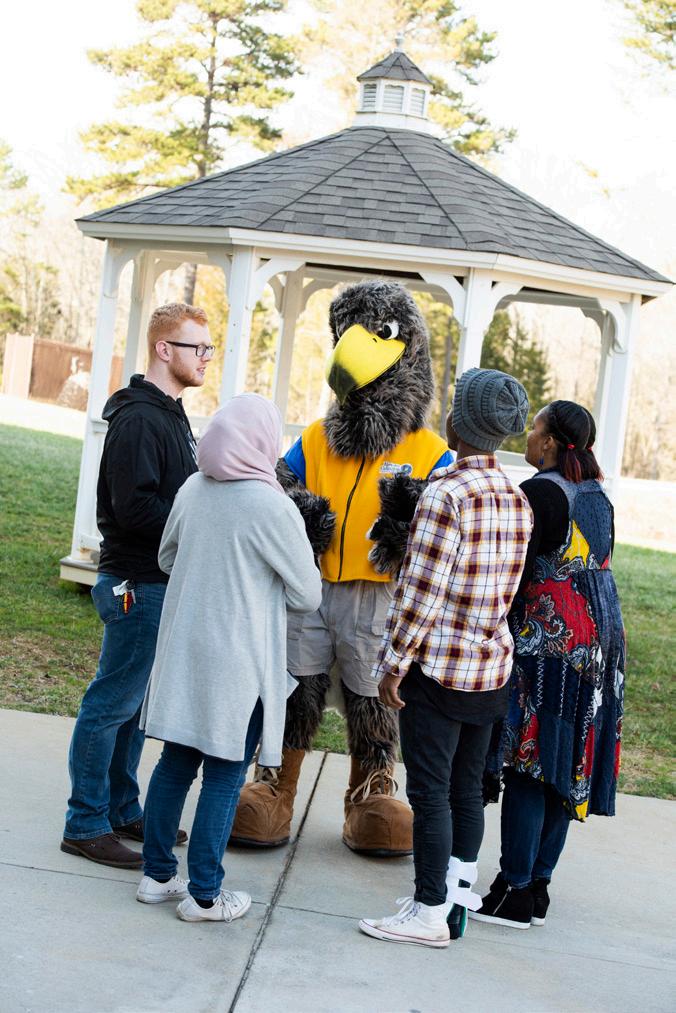
“As president of R. S. Braswell Company, I appreciate the impact this program can have on our community. The Light Diesel Mechanic program will respond to the growing need of training technicians to work on ‘intelligent equipment.’ This program would offer students the opportunity to obtain skills in electrical, mechanical, and computer technologies. With this training, these graduates will be qualified to meet the current and future employment demands in our area,” said Steve Thigpen, president of R. S. Braswell Company.
In North Carolina, employment for diesel technicians is projected to grow 13.6 percent from 2014 – 2024, which is expected to result in average annual growth of 230 jobs. The median annual wage for diesel service technicians and mechanics was $44,520 in May 2015. These positions will provide a livable, sustainable wage for these students, improving quality of life for them and their families.
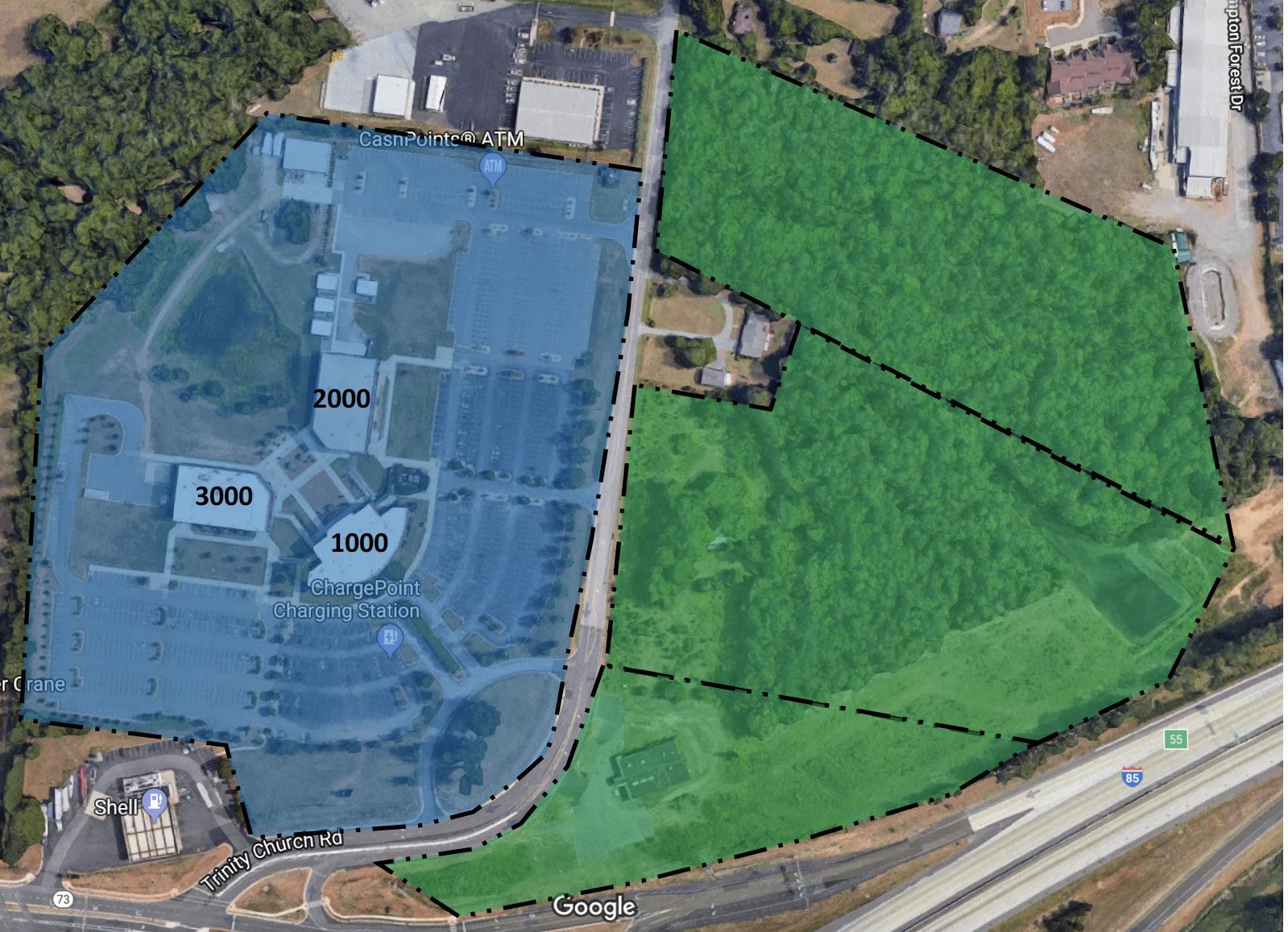


“We want students and the community to see RowanCabarrus as their partner for life. A college where people care for you throughout your life and your career goals and interests.”
– Natasha Lipscomb, vice president of student success
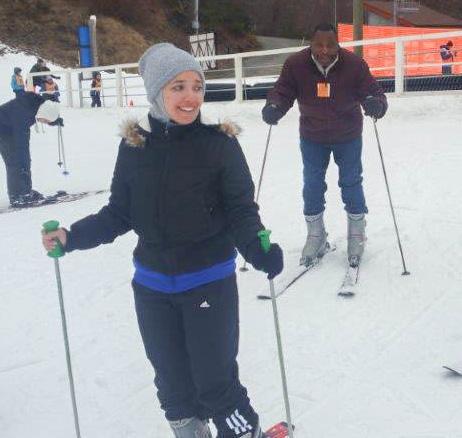
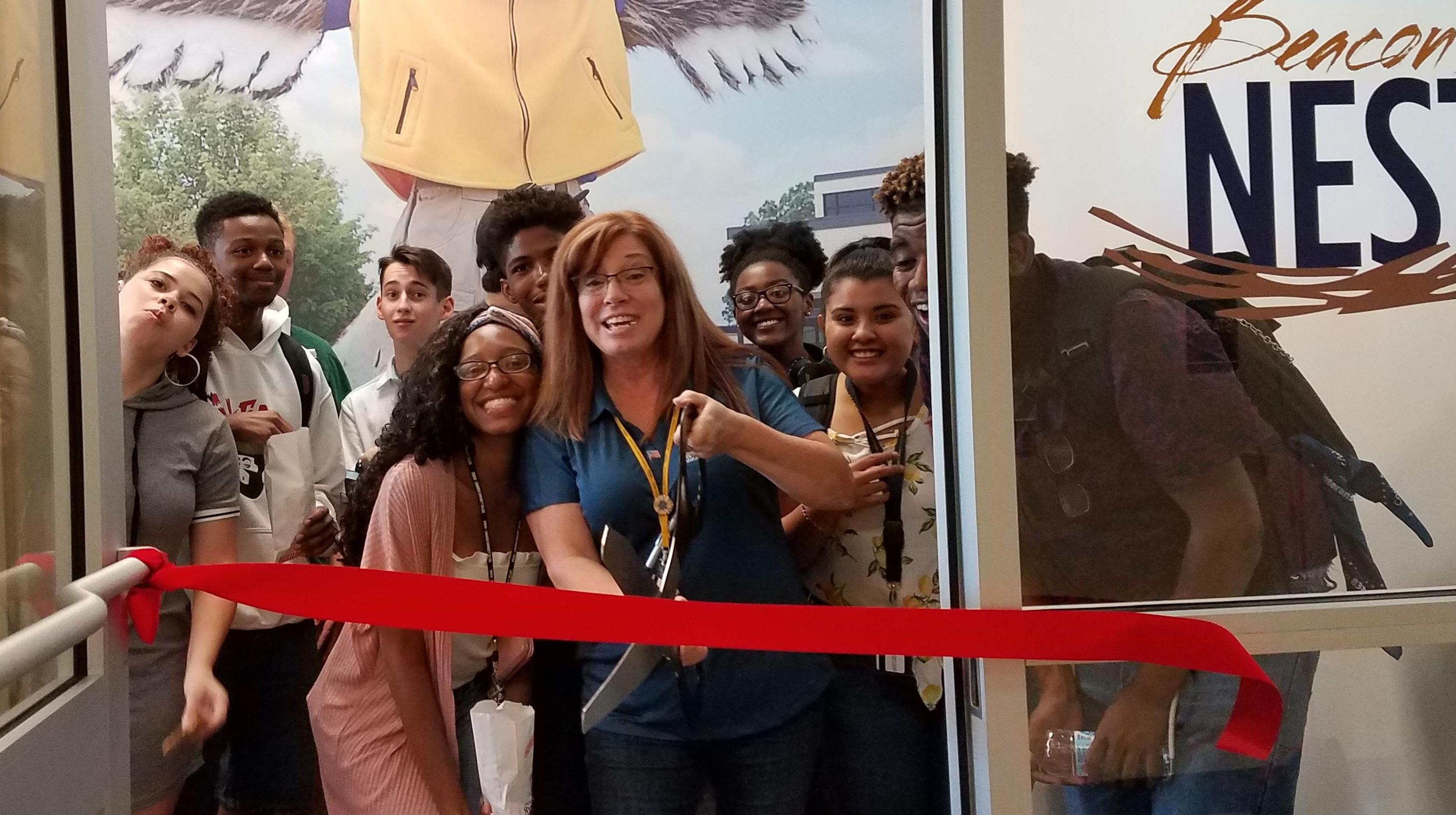
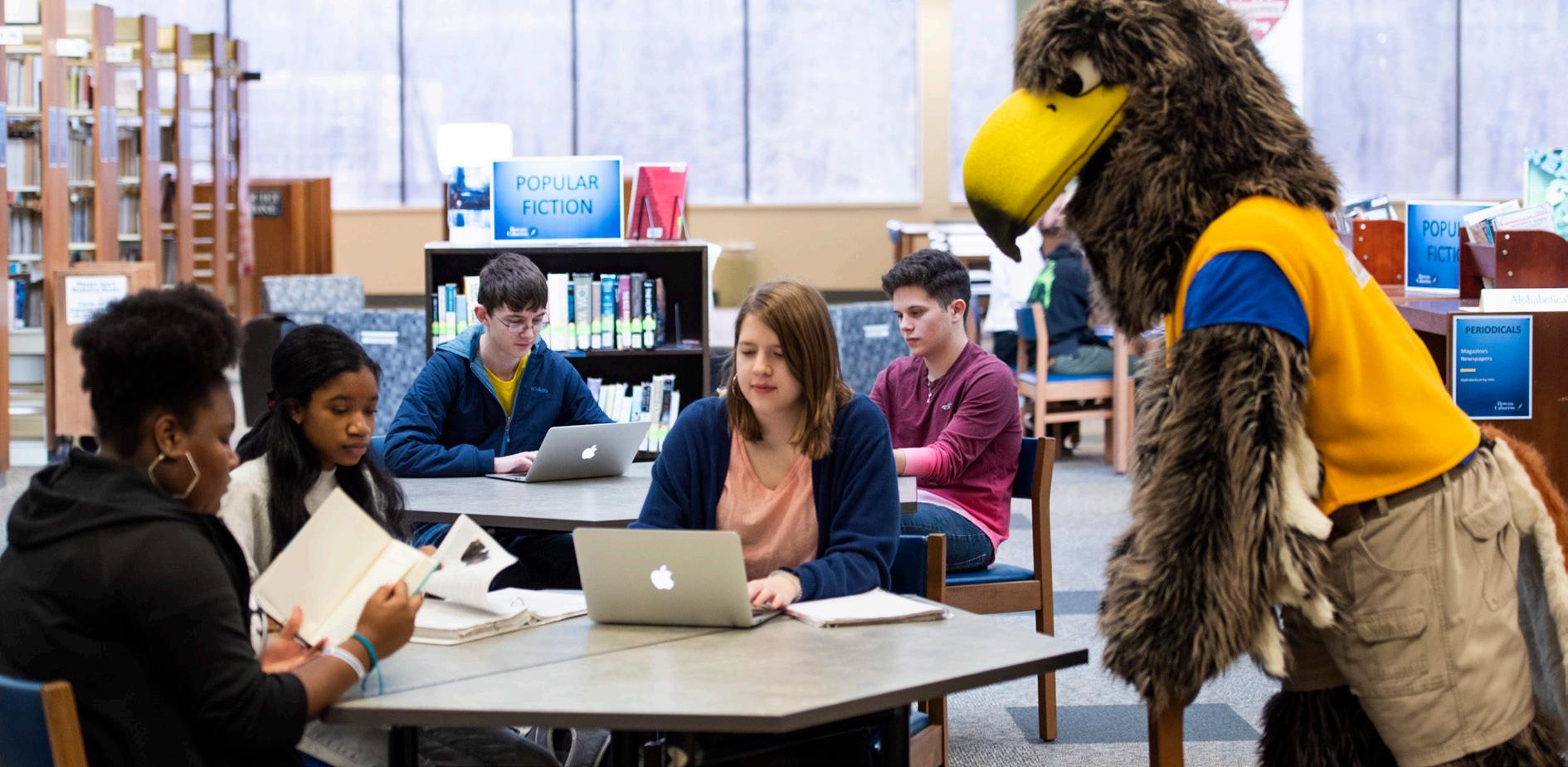
The College was proud to launch an innovative, forward-looking five-year strategic plan in 2018.
One of the four pillars of the strategic plan is to engage. Rowan-Cabarrus Community College is committed to preparing students to be responsible and productive citizens.
This includes providing holistic advising, resources and support services to optimize the student experience. It also calls on the College to establish Rowan-Cabarrus as the first choice for higher education.
Another objective is to increase student participation in co-curricular and extracurricular activities to produce well-rounded leaders. And finally, the College is committed to partnering with students for life.
“We want students and the community to see Rowan-Cabarrus as a college where people care for you throughout your life and your career goals and interests,” said Natasha Lipscomb, vice president of student success. “We are committed to building sustainable futures through the power of learning. We want to help our students weather the storms and thrive in their careers.”
Over the last couple of years, Rowan-Cabarrus Community College has made significant changes to organizational structure, processes, and programs to better engage with students.

“The student success model is all about connecting and engaging with students in a proactive way. It’s about giving students a team of people responsible for helping them to succeed,” said Lipscomb. “We have successfully created a model that meets students where they are, empowers them to see what their future can be, and helps them achieve their goals for a better tomorrow!”
Thanks to the changes and innovations the College has made over the last couple of years, Rowan-Cabarrus was pleased to buck the state and national trend of declining enrollment. For instance, enrollment for fall 2018 was up more than eight percent from the year before.
To address the issues around the cost of textbooks, the College has made a number of changes. The largest of those was to move to an online bookstore format through a partnership with Akademos.
“Our number one concern was to reduce costs for our students. The price of textbooks has continued to go up across the country, and we wanted to do what we could to combat that,” said President Spalding.
The College community also continues to embrace Beacon, a red-tailed hawk and the College’s mascot. Now students can visit his home – the new spirit stores opened at North Campus and South Campus were fittingly named Beacon’s Nest.
Beacon’s Nest serves as a spot for snacks, coffee – a staple for college students and employees, and a place to study between classes. The vision was to create a homey place for people to enjoy and to really step up the merchandising opportunities for the College.
“We have long wanted to take the College’s branded gear to a different place and this gave us the perfect opportunity. I love seeing students wearing the t-shirts and hoodies on campus. You can tell they love it,” said Allison Robinson, director of graphics at Rowan-Cabarrus, who co-led the creation of Beacon’s Nest.
The new branded materials are helping to build a sense of pride and a more collegiate atmosphere.
“We really listened to our students,” said Autumn Kinnaird, payroll analyst at the College, who co-led the creation of Beacon’s Nest. “The students asked for a coffee house feel, and we achieved that by purchasing many items second hand. In addition, we have tried to be as sustainable as possible, such as the coffee packets being recycled, wooden stir sticks instead of plastic, and paper cups instead of Styrofoam.”

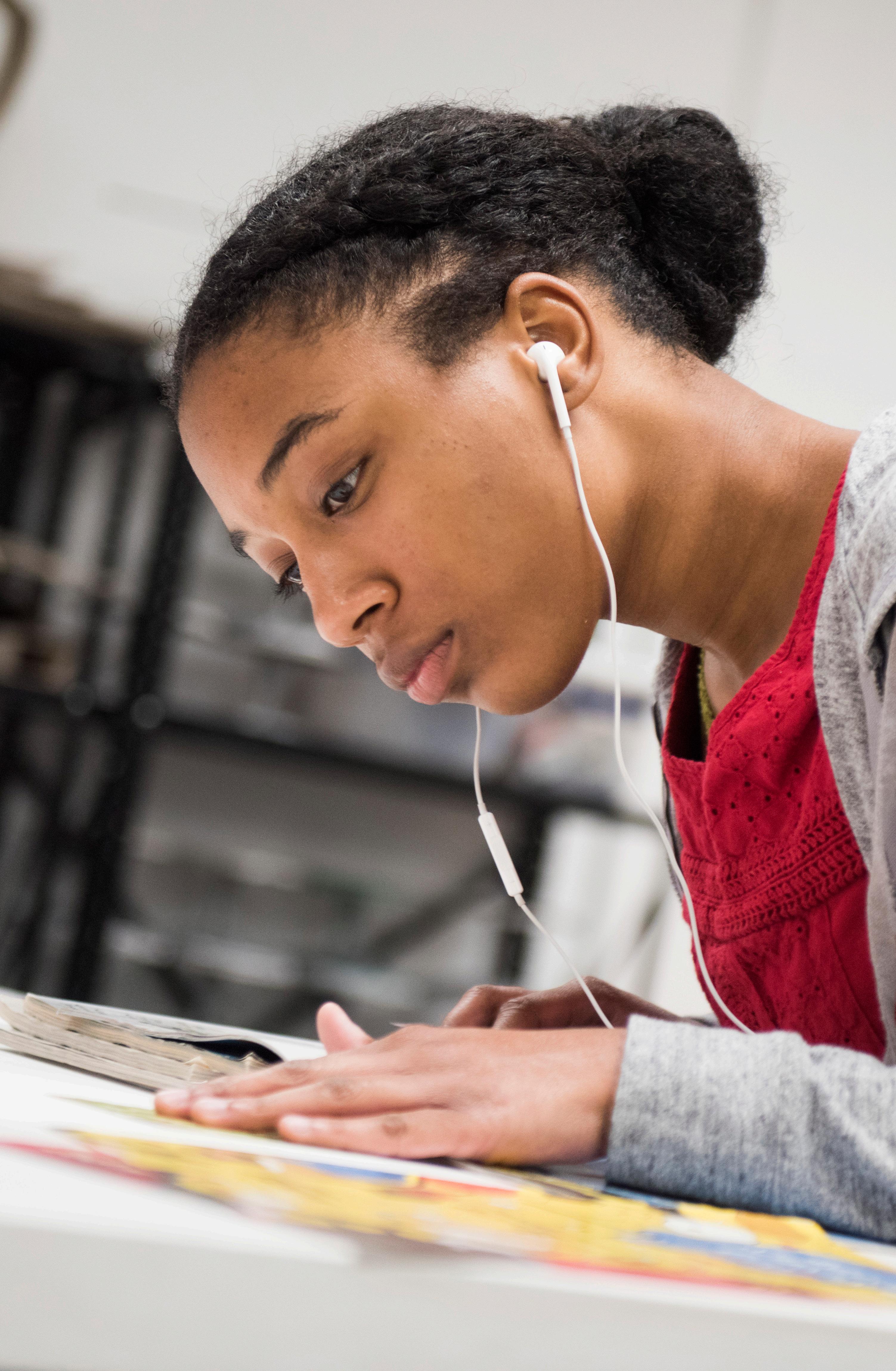
ommunity college, for many students, is just the first step in their higher education goals.
Rowan-Cabarrus Community College has long been a great place for students to acquire a transferable two-year associate degree. Many students earn these degrees and transfer to any number of public or private colleges or universities to earn bachelor’s degrees.
“Students are savvy consumers, and they’re seeking a two-year degree as a means of scaffolding their credentials in ways that make sense for them,” said Natasha Lipscomb, vice president of student success. “More and more, students are customizing their education.”

For many parents, it is increasingly difficult to figure out how they will be able to afford the cost of a college degree for their children. The rising costs of a college education present barriers to even middle class families.
“It’s not a secret that the cost of higher
education has gone up,” said President Spalding. “In past decades, graduates could earn in salary what a bachelor’s degree cost. No longer. North Carolina community college tuition helps students get a better return on investment.”
Long gone are the days where the only path to a four-year degree was to go directly to a university. In fact, nearly half of all students graduating with a four-year degree in the 2016-17 academic year previously attended a two-year public institution. High-quality and affordably priced classes are persuading more students to begin their quest for a bachelor’s degree at a community college.
“About half of all Rowan-Cabarrus students intend to transfer and complete a bachelor’s degree,” said Lipscomb. “Our 15:1 facultystudent ratio means that our instructors – educated with a minimum of a master’s degree – can give each student the individual attention they deserve.”
Making the transfer process seamless and painless for students has become a big focus for the College. More students are transferring to earn bachelor’s degrees – in fact, the College has had an increase of thirteen percent from last year.
Rowan-Cabarrus also prepares students for success in their coursework at their ultimate transfer institution. Over 63 percent of the College’s transfer students outperform “native” students with a first year GPA of 2.5 or higher versus 56 percent for the system average.
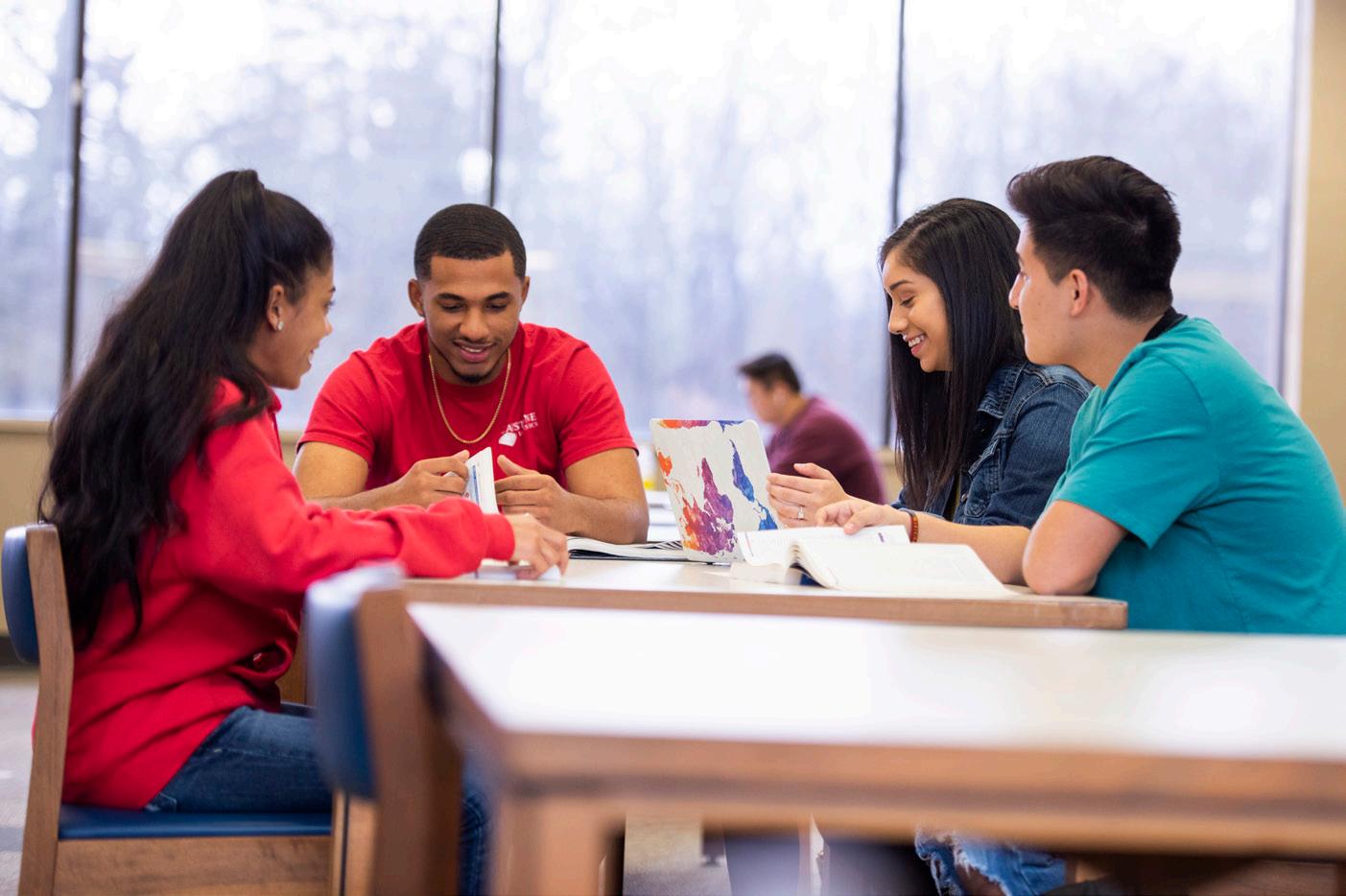
Rowan-Cabarrus Community College is committed to a strong partnership with our local K-12 school systems.
The College and the school systems work together to support three early college programs and nearly 1,100 traditional high school juniors and seniors who are taking college-level courses through the Career & College Promise program.
Changes at the state level have made taking classes at Rowan-Cabarrus even more attractive for high school students.
This year, for the first time, the state has recognized the added value that community colleges bring to the K-12 public education system. Now, the college transfer courses offered through Rowan-Cabarrus are weighted at the same level as Advanced Placement (AP) courses.
“I found the courses at Rowan-Cabarrus to be a better fit for me. I wasn’t excited about taking an AP class and having to take a test at the end of the year. This way, when I pass the class, I earn the college credit right away,” said Emma Ryerson, senior at West Rowan High School.
The highly successful Career & College Promise tuition-free program at Rowan-Cabarrus provides the opportunity for high school juniors and seniors to get a “jump start” on their degree while still in high school. Rowan-Cabarrus is leading the state as the largest provider of these offerings to high school students.
“This fantastic program allows students to simultaneously enroll in high school and college so that they can receive both high school and college credit for courses taken as part of the program,” said Cyndie Mynatt, vice chair of the College’s board of trustees.
Unlike the early college high school programs, Career & College Promise allows students to remain very involved in their current high school. They
can still play sports and engage in all of the regular extracurricular activities.
“One perk of this opportunity is getting to experience real college classes – students ultimately feel better prepared when they transfer because they’re confident in their ability to do college-level work,” said Dr. Michael Quillen, vice president of academic programs at Rowan-Cabarrus.
There are two tracks for the Career & College Promise program – one allows students to specialize in a career or technical pathway, while the other allows students to prepare for general transfer.
In addition to general education college transfer classes, Rowan-Cabarrus offers options for students to get a head start in careers like criminal justice, machining, cosmetology, IT, welding and more. Students can take as many classes as their schedule allows, with some students taking as many as four college classes in a single semester.
“We look forward to seeing further expansion in this area as more parents and students become aware of what very well may be the best kept secret to getting ahead while still in high school,” said Dr. Janet Spriggs, chief operating officer and leader of the Division of Student Success. “I also hope this program will continue to convince more and more young people to come directly to Rowan-Cabarrus out of high school to further their education.”
The College’s three early colleges are award-winning and high-achieving, the latest of which opened in the fall of 2016 at the College’s Cabarrus Business and Technology Center (CBTC). This early college also allows students to explore technical career paths such as IT and engineering. They will see their first graduating class in 2020.
These popular, prestigious high school/college programs allow students to earn a high school diploma and an associate degree simultaneously. Many graduates of these successful programs go on
to earn significant scholarships and transfer as college juniors to highly respected universities.
Not only are these students successful, with both of the long-standing early colleges graduating 100 percent of their seniors from high school in 2017-18, but the schools themselves are remarkable. Another exciting development in 2017 was the expansion of the on-site programs in high schools for Career Technical Education (CTE). These technical education programs bring highly trained and qualified college faculty into the local high schools to teach college courses. The programs include IT mobile application development, drafting, nurse aide II, early childhood education, welding, advertising and graphic design, and IT essentials.
“Bringing these dynamic, hands-on classes directly to the schools is a winwin-win for the College, the schools and the students,” said Dr. Quillen. Finally, the College was awarded a NC Works Career Coach grant which
has allowed the College to partner with the RowanSalisbury School System to provide two career coaches in three high schools to help students gain career clarity, and to support students who do not have a plan for post-graduation.

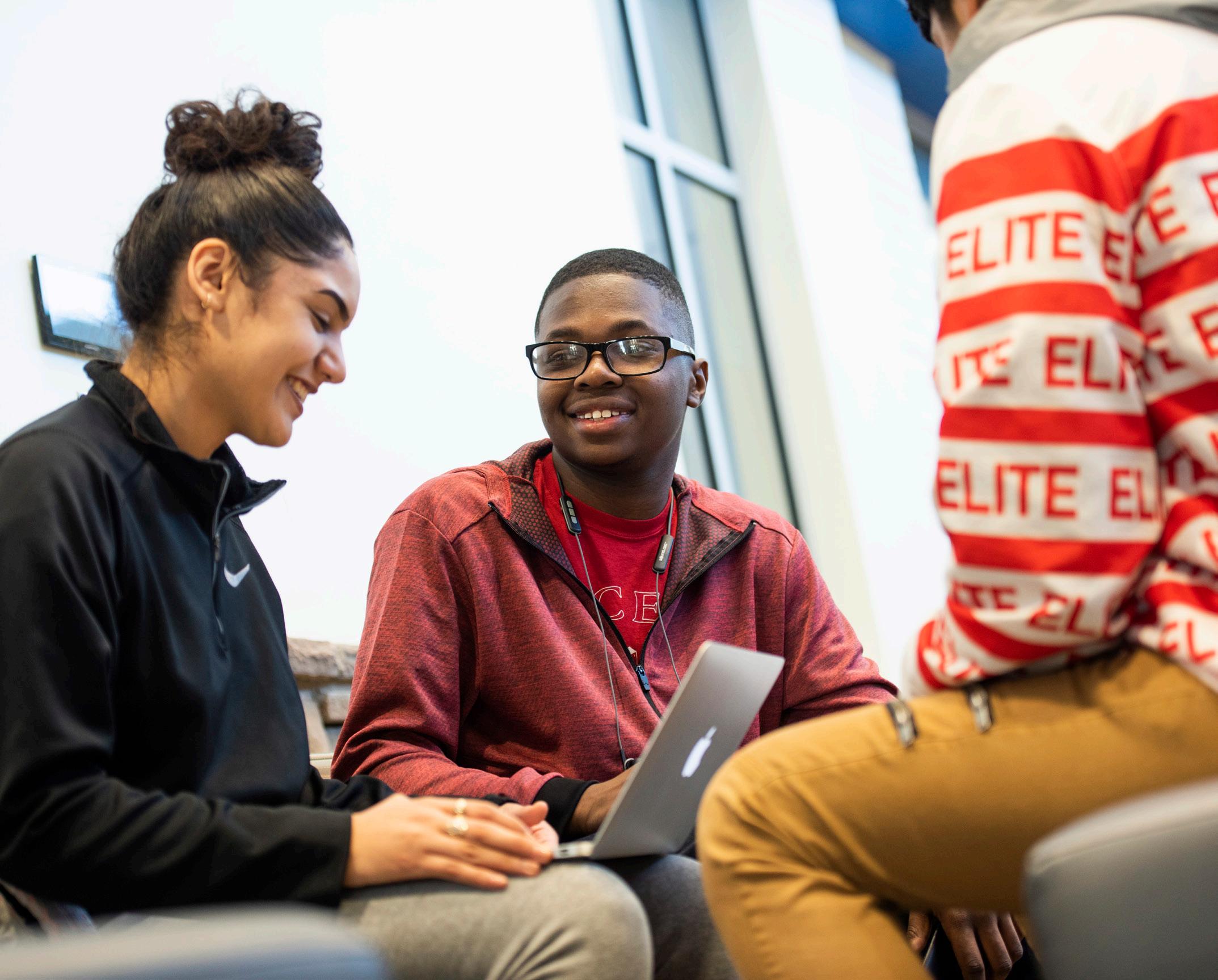
The Excellence in Teaching award recognizes superior faculty who go above and beyond the expected levels of delivering instruction and improving educational excellence as demonstrated by student outcomes.
“Rowan-Cabarrus Community College is committed to excellence for our teachers and our students,” said President Spalding.
Each year, the College undergoes a process to identify the best instructors. Faculty, staff and students have the opportunity to weigh in on the nominations and vote for the top instructors. Then, the top nominees are asked to complete an extensive and rigorous self-review process, culminating with an unannounced video observation of the instructor in action in the classroom.
In 2018, the College’s Outstanding Excellence in Teaching Awards were awarded to Jessica Fowler, full-time mathematics instructor, and Leslie Pullen, part-time anatomy lab instructor.
Jessica Fowler has been a faculty member of the mathematics department at Rowan-Cabarrus for three years. Fowler holds a Bachelor of Arts in Mathematics with a minor in Education and a Master of Arts in Mathematics Education from the University of North Carolina at Charlotte. In addition to teaching mathematics, she is a co-advisor for Phi Theta Kappa and a team leader for MAT 143, Quantitative Literacy.
“I became a math teacher to show others how fun and exciting math can be,” said Fowler. “I strive to create a positive learning experience where students feel comfortable asking questions and collaborating with their peers.”
She currently resides in Midland, N.C. with her husband and three-year-old twin daughters. Fowler enjoys spending quality time with her family, reading, and hiking.
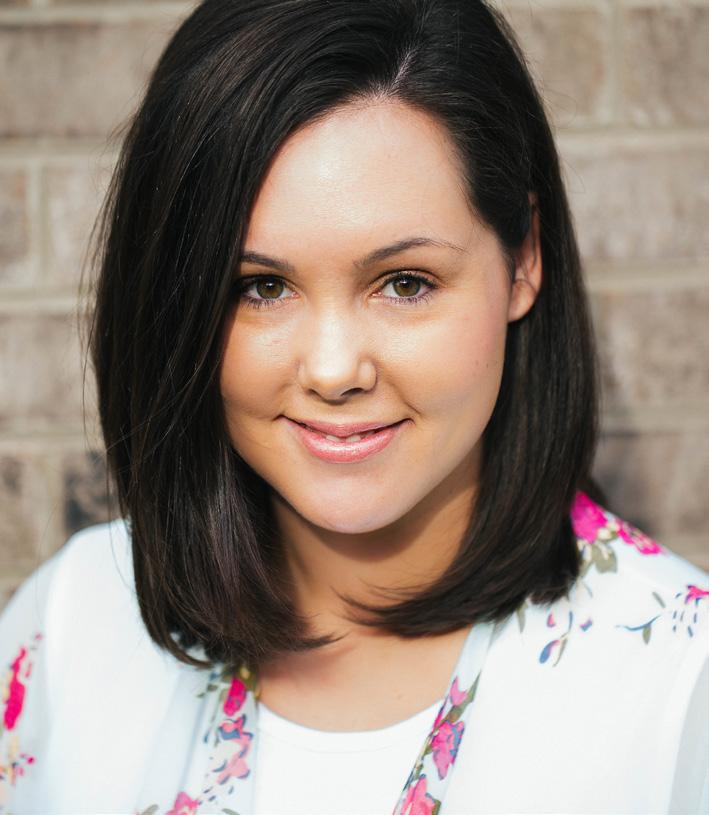
Leslie Pullen, the College’s part-time recipient, holds a Bachelor of Science in Biology from McGill University in Montreal, Canada, and a Master of Education in Science Instruction from the University of North Carolina at Greensboro. Pullen has been an adjunct lab instructor at Rowan-Cabarrus for 15 years.

“Science is my passion and I want to ignite a fire in my students to be curious and to investigate the unknown,” said Pullen. “I encourage my students to also seek a career that they too can be passionate about.”
Students initiate the nomination process for this award annually by recommending their top instructors. Students then help narrow that pool of candidates by voting for their favorites who best represent the College’s instructor of the year. Final nominees are then required to submit an extensive portfolio, letters of recommendation and submit to an unannounced, filmed observation.
“Rowan-Cabarrus Community College has a long and proud tradition of hiring highly qualified and dedicated faculty in all of its academic programs,” said Dr. Michael Quillen, vice president of academic programs. “The faculty members selected for this year’s Excellence in Teaching Awards certainly are representative of this tradition. These faculty members, and many others, do a wonderful job of providing high-quality instruction to the students at Rowan-Cabarrus.”
Two-hundred and forty-four students graduated from Rowan-Cabarrus with their high school equivalency diplomas in 2018.
“The high school equivalency test opens the door to college and better jobs. It gives the graduates the respect they deserve and the satisfaction of earning a high school credential with the hope that they will continue with their education,” said Jay Taylor, executive director of the Rowan-Cabarrus college and career readiness programs.
Graduates ranged in age from 16 to 73. The RowanCabarrus Community College Foundation plays an important role in awarding 100 students the funding necessary to help pay for their GED testing requirements.
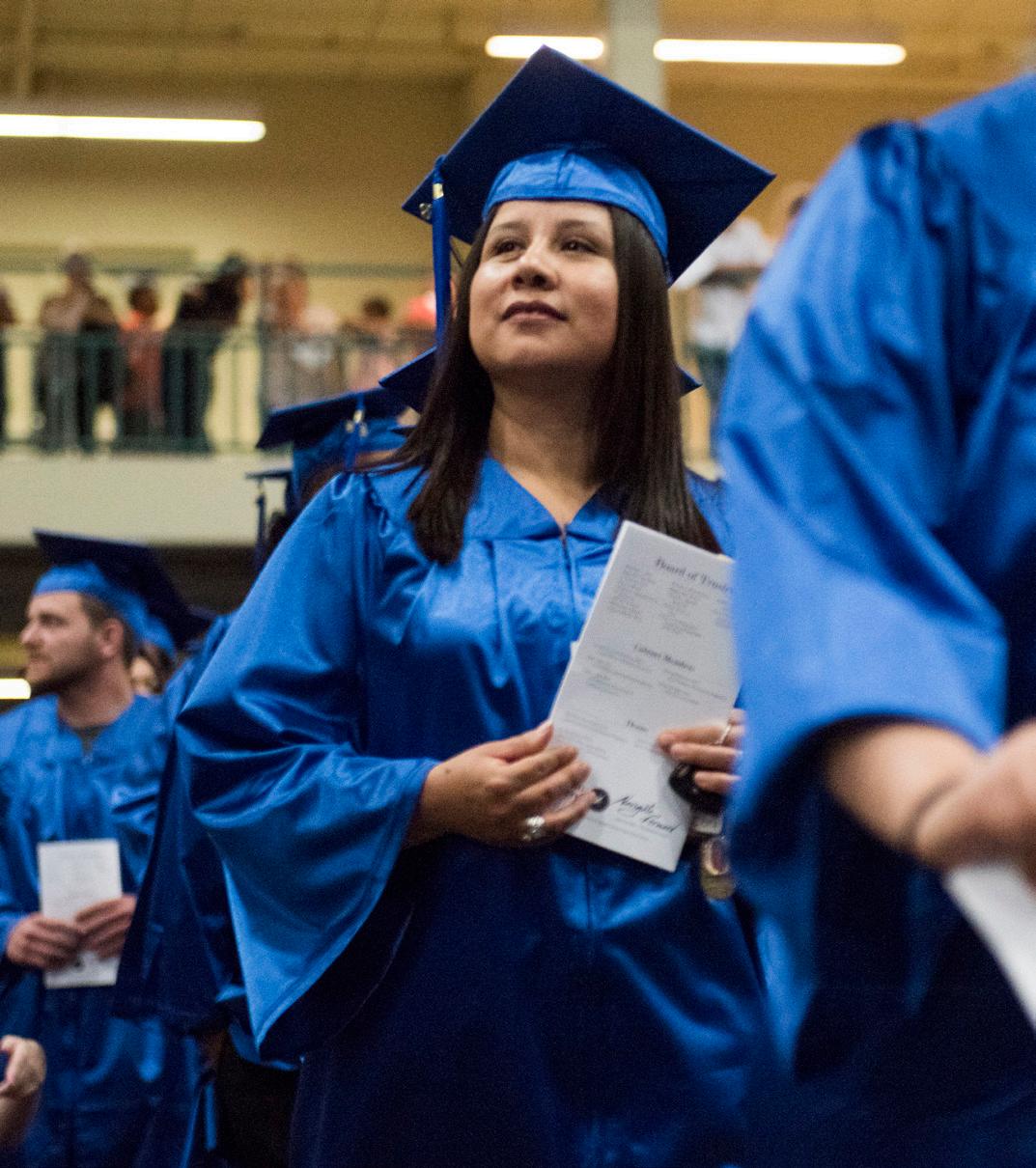
Rowan-Cabarrus provides both instruction and resource materials to students preparing for the High School Equivalency at no cost. Classes are scheduled on the North and South campuses and at a variety of community locations for convenience and access.
“Our goal is to bring education to the students. It’s our ‘meet them where they are’ philosophy,” said Craig Lamb, vice president in corporate and continuing education. “While it’s not possible for every program, our overarching goal is to be available and accessible to students. That’s why our students can now earn numerous degrees completely online. It’s why the high school equivalency classes are offered morning, afternoon, evening, online and at multiple locations across the College’s service area.”
Students are given an assessment test upon entering the program, from which an individualized learning plan is developed for each student. This identifies the area(s) the student needs to master and sets a clear pathway to successfully pass the high school equivalency exams. The College’s SOAR (Skills, Opportunities, Awareness, and Readiness) program continues to grow and expand. This program is for those that are intellectually disabled or those who
have been diagnosed with a traumatic brain injury. The SOAR Program utilizes contextualized learning opportunities to equip students with the tangible skills that are necessary for them to gain employment. The SOAR Program has numerous partnerships throughout Rowan County with local businesses in which students learn job skills, communication skills, and build resumes.
“Approximately 20 percent of our participating students gain employment as a result of this program,” said Craig Lamb, vice president of corporate and continuing education. Additionally, the Rowan-Cabarrus English Language Learner (ELL) program has seen an increase in enrollment, as well. There are over 200 students enrolled in this program. In combination with this program, the College has launched a citizenship class that will enable these students to learn more about the history of our nation while pursuing a pathway to permanent citizenship in the United States.
Rowan-Cabarrus Community College hosted its seventh annual STEM Open House at the College’s North Carolina Research Campus (NCRC) in Kannapolis in April.
“The STEM Open House was a true celebration of science, technology, engineering and math,” said President Spalding. “I fully believe that everyone should be interested in STEM – and that it’s critical that we embrace these subjects. The United States used to be the leader in technology and innovation. It’s time for us to reclaim that role. Because of this, STEM is an important focus for Rowan-Cabarrus.”
Over 790 members of the community and students visited the STEM Open House, a fun, interactive event for the community showcasing the College’s science, technology, engineering and math programs.
Faculty created dozens of interactive exhibits for kids and adults of all ages to spark the senses and stir curiosity for all things STEM. Attendees were able to view strawberry DNA, make ice cream using dry ice, experience virtual welding, and even engage in activities involving how germs pass from person to person.
In addition to all of the indoor exhibits, the College hosted the new Novant Health Med Flight helicopter. Students and community members were able to look in and around the aircraft, as well as ask questions of the flight crew. A couple of lucky children were even able to sit in the pilot’s seat!
“Almost everything we do in life has STEM applications, but not everyone realizes it,” said Dr.
Carol Scherczinger, dean of arts and sciences. “STEM subjects are very concrete. Science deals with our natural and physical world. Technology has given us the iPads, smart phones and computers we use every single day. Engineering is all about building things. Mathematics ranges from financial decisions to gaming strategies, such as playing pool or engaging in games of logic.”
The exhibits were extremely diverse – everything from the chemistry of extracting DNA, to the creation of milk fireworks, to star gazing to view the College’s named star!
“Holding this event at the College’s North Carolina Research Campus (NCRC) facility makes a lot of sense. Our NCRC building is the home of our biotechnology and nursing programs – two of our most STEM intensive curricula,” said President Spalding.
The STEM Open House was held in conjunction with the statewide NC Science Festival focused on engaging the younger generation in science. Events across the state were designed to bring science to life for students and their parents.
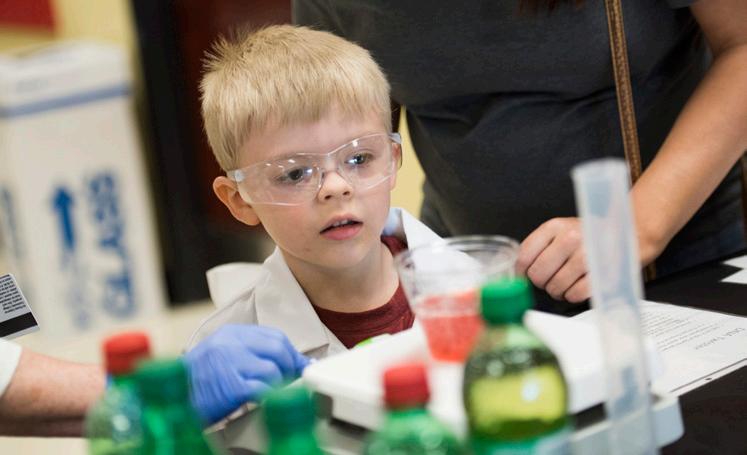


Rowan-Cabarrus Community College, in conjunction with Duke Energy, hosted a Taste of Industry event showcasing the available trade career options through the College’s technical pathway programs.
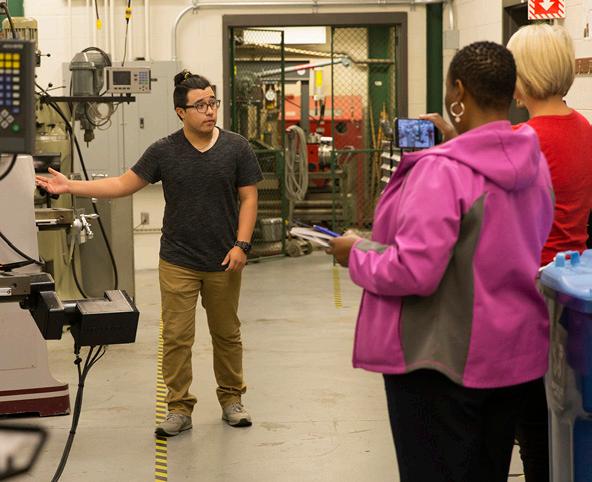
“We are grateful to Duke Energy for their support of Rowan-Cabarrus Community College,” said President Spalding. “Their continued support and significant contributions to the College over the last few years have been vital.”
The event featured a panel of leaders from industry fields, such as machinists, welders, and IT management, who answered questions regarding job placement, salary expectancy, and additional employee benefits. High school teachers, counselors and college instructors joined together to explore the vibrant career options within these different fields and industries.
“Our goal for this event was to engage with core subject high school teachers to show them what careers in technical education really look like,” said Dr. Van Madray, dean of business, engineering technologies & public services. “Many were surprised at the careers available – these are not your
grandfather’s jobs. They are hightech, highdemand, and high paying.”
In addition to the great one-day event, the grant also allowed the College to purchase curriculum kits for each teacher in attendance to be taken back to the classroom. The kit was comprised of calculators, calipers, a networking kit (raspberry pi), a poster, and a flash drive complete with five full lesson plans.
Today, manufacturers across the country are facing a skills gap between the technical skills their employees need and the skills they find in applicants. Rowan-Cabarrus is working diligently with manufacturers to do its part in addressing the gap that prohibits employers from filling these high-tech, high-wage jobs. The Duke Energy grant continues to help the College to further that mission.
and active citizens is a part of our job at the College. These students will definitely leave Rowan-Cabarrus equipped to lead in their careers and communities.”
The 2018-19 Rowan-Cabarrus Student Ambassadors include:
• Brittany Ingram, Associate in General Education, lives in Salisbury;
• Jala Moore, Associate in Arts, lives in Harrisburg;
The Rowan-Cabarrus Student Ambassador Program is a group of outstanding students who are selected to represent the College in multiple capacities. These student leaders reach out to prospective students, conduct campus tours, participate in and help promote various college events and assist with the successful transition of students to the campus. The program is supported by the Rowan-Cabarrus Community College Foundation, which provides ambassadors with a scholarship for their service to the College.
“I’m very proud of the Rowan-Cabarrus Student Ambassador Program and this year’s new group of leaders,” said President Spalding. “We believe that developing our students into community leaders
• Adrian Stallings, Associate in Business Administration & Marketing, lives in Concord;
• Markala Tucker, Associate in Business Administration, lives in Concord;
• Jaeda Wagner, Associate in Arts, lives in Concord; and,
• Gracelyn Watson, Associate in Arts, lives in Kannapolis.
Student Ambassadors are dedicated to student success, diversity and strengthening student connections. Ambassadors enjoy working with people, are committed to creating change in their respective communities, and are excited about sharing their experiences at Rowan-Cabarrus with others.
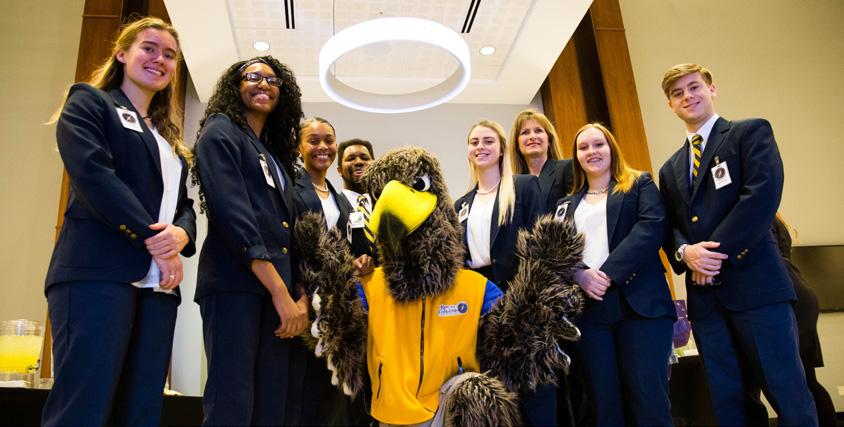

Thanks to a $224,000 grant from the National Science Foundation, Rowan-Cabarrus Community College has created a new initiative called Women in Engineering and Industrial Technologies (WEIT) to promote the enrollment of women in fields related to Science, Technology, Engineering and Math (STEM).
In partnership with the National Science Foundation’s Advanced Technological Education (ATE) program, the WEIT initiative aims to increase engagement and preparation of female students for high-tech careers that drive much of our nation’s economy.
WEIT leverages the strong collaboration between Rowan-Cabarrus, three K-12 school districts, and more than 40 partner employers of the North Carolina Manufacturing Institute to encourage women to explore engineering and industrial technology programs.


“Today, manufacturers across the country are facing a gap between the technical skills their employees need and the skills they find in applicants,” said President Spalding. “Rowan-Cabarrus is working diligently with manufacturers to address the barrier that prevents employers from finding skilled, welltrained candidates. The National Science Foundation grant enables us to further that mission.”
The College engages career influencers such as guidance counselors, teachers, advisors and ParentTeacher Association (PTA) members to participate in its annual Taste of Industry event and other outreach efforts such as the Industry Speaks series, which are designed to highlight the many career options
available through industrial and technical pathways.
“Our goal is to show students and career influencers what careers in technical education really look like. We discuss our industry-related programs, such as information technology, welding and machining, and give them an opportunity to participate in interactive simulations,” said Dr. Van Madray, dean of business, engineering technologies and public services at Rowan-Cabarrus. “Many are surprised at the high-tech, high-demand and high-paying careers available.”
The WEIT program hopes to increase completion rates among women in technical career programs, such as machining, engineering, information technology, mechatronics, and welding. Women enrolled in these programs have the opportunity to be WEIT ambassadors, participate in the WEIT Navigators group, and attend open lab events. The program also provides increased partnerships and communication networks between faculty, staff, students, parents, administrators and industry representatives.
“Women have been inadequately represented in the manufacturing industry for years, which is disappointing because females have the untapped potential talent needed to address the manufacturing skills gap in our communities,” said President Spalding. “The WEIT program strives to change outdated perceptions of students and career influencers so that they see the manufacturing industry as a valid and lucrative career option for both women and men.”
A new collaborative effort called the Bridges to Baccalaureate Program is designed to help students at UNC Charlotte, Gaston College, and Rowan-Cabarrus Community College complete undergraduate biomedical degrees and, ultimately, succeed in biomedical careers.

The initiative is made possible by the National Institutes of Health, with funding expected to total $1.37 million over five years. The program will work with a total of 45 students who will earn their associate degrees at Gaston College or RowanCabarrus before transferring to UNC Charlotte to complete their bachelors of science degrees in the biomedical sciences.
In spring 2018, the program announced funding from the National Science Foundation for the SPARC4, or STEM Persistence and Retention via Curricula, Centralization, Cohorts, and Collaboration, Project.
“We are thrilled to once again partner with UNC Charlotte in a program that will benefit STEM students,” said Ashley Hagler, who is the SPARC director, as well as director of undergraduate research/biology coordinator, at Gaston College.
The partnership includes three areas of emphasis, following a Guided Pathway to Success model. First, students will receive academic advising while
using “degree maps” to help them chart their academic course. They also will experience individualized mentorship, cohort learning, and course tutoring at the community college and university institutions.
“This grant gives our students an opportunity to get real world research experience,” said Dr. Carol Scherczinger, dean of arts and sciences at RowanCabarrus.
Second, students will conduct independent research projects with faculty at the community college and later at UNC Charlotte. Research at UNC Charlotte will include independent research in a laboratory, conducting cutting-edge biomedical sciences research.
Third, to show how biomedical sciences fit in the real world, transfer students will be paired with senior student mentors at the university level, attend regional networking events for biomedical professionals, participate in professional development workshops, and take courses in bioethics.
Rowan-Cabarrus Community College was one of 10 community colleges in the nation selected as a finalist for the national Bellwether Awards.
The Bellwether Awards annually recognize outstanding and innovative programs and practices that are successfully leading community colleges into the future.
Rowan-Cabarrus presented their e-text initiative, which the College utilizes to provide affordable, accessible, and adaptable resources through various digital learning platforms to students.
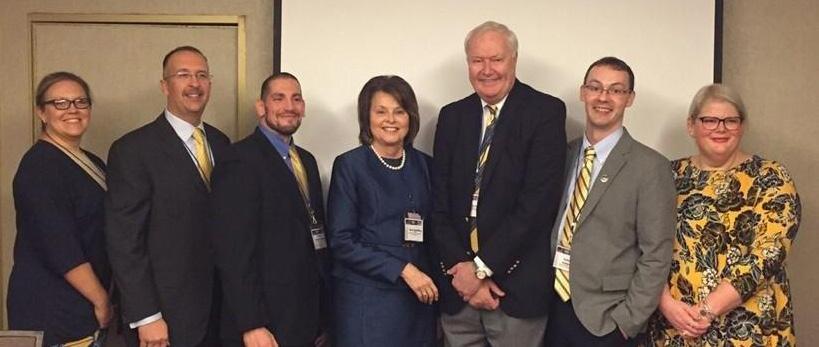
“The College understands the importance of online learning, and we were proud to share our student-focused digital initiatives with the Bellwether panel,” said President Spalding.
The following represented Rowan-Cabarrus:
• Carl Short, Jr.
• Dr. Carol Spalding
• Angelo Markantonakis, associate vice president, academic programs
• Dr. Jenny Billings, chair of English, developmental reading & English, & ACA
• Melissa Reid, chair, mathematics
• Zackary Hubbard, chair, information technology
• John (J.T.) Hinson, Alumni, Class of 2017
The purpose of the RowanCabarrus Community College Foundation is to raise and manage funds, and enhance relationships that support the work of the College.
Thank you to the following individuals, corporations, foundations and organizations for contributing to the RowanCabarrus Foundation. This listing represents gifts during the 2018 calendar year and every effort has been made to include all contributors. If your name was omitted, please know that your gift is appreciated and will be acknowledged.
Robert Abbate
Tom and Dorothy Abramowski
Karen Alexander
Keri Allman
Ben Allred
Tony and Margaret Almeida
AmazonSmile

Americhem
Amesbury Truth
Rebecca Anderson
Dean Andrews
Greg and Cordelia Andrews
Kelli Antonides
Michael and Pearl Asbury
Asmo North Carolina, Inc.
Jim and Sheena Atkinson
George Bame
Hobert and Wanda Barefoot
Karen Bargsley
Janice Barnes
Kim Barnett
David and Wendy Barnhardt
Matt and Gwin Barr
Cheryl Baskins
Kenn Bass
BB&T Concord
Tony Bean
Tripp and Carol Beaver
Ben Mynatt Family Of Dealerships
Marjorie Benbow
Miriam Berrospi-Kish
BestCo, Inc.
Jenny Billings
David Bingham
Blowin’ Smoke
Jenny Bodenheimer
Dan and Teena Boone
Brad Bost
Donald Bost
Tom and Rochelle Bost
Elizabeth Bowman
Clay and Ellen Boyd
Bob and Deborah Appling
Brannan, III
Brenda Hammond Spindale Florist
Jeffery Brian and Michelle Riley
Kimberly Briggs
Angela Brown
Ralph and Helen Brown
Tim Brown
Paul and Melissa Brown
Brown Antique Equipment
Tracie Pfaff Brunt
Phyllis Buie
David Byers
Peter and Stephanie Bynum
Cabarrus Brewing Company
Cabarrus Country Club
Flora Calderon-Steck
David and Darise Caldwell
Robert and Jennifer Canipe
William and Ann Cannon
Canteen Vending
Cardinal Glass Industries, Inc.
Thomas Carlton, Jr.
Carolina Beverage Group, LLC
Carolina Precision Manufacturing, LLC
Stan and Carolyn Carpenter
Donna Carpenter
Paul and Lois Carter
Jessie Carty
Casco Signs
Kelly Castelloe
Steve Cathcart
Adeline Caton
Cengage Learning
Century 21 Towne & Country
CESI Civil-GeotechnicalSurveying
CFMA Charlotte Area
Jonathan and Cameo
Chamberlain
Jarrett and Connie Chandler
Cathy Chandler
Tim Hagler-Charlotte Motor Speedway
Chick-fil-A
Ward Childress
Thomas Childress
David Chizmadia
Joe Christie
CiCi’s Pizza
Lori Cinquemani
Lori Clay
Anne Scott Clement
Clifford A. & Lillian C. Peeler Family Foundation
Ken Clifton
Cloninger Ford-Toyota-Scion
Delores Coleman
Barb Collins
Shemeda Conyer
Jenna Cook
Caroline Cook
Cheryl Cooke
David Cooke
Lynn Coughenour
Daryl and Susan Cox
Scott Cozart
Cracker Barrel
Martha Cranford
Joan Creeger
Doug Cremer
Millie Cress
Joseph and Ruthanna Crews
Rod and Rita Crider
Jon Crockett
Donna Crook
Daniel and Paige Crowe
Kevin Crutchfield
Sue Cunningham
Anne Curlee
Custom Golf Supply, Inc.
D & B Realty, Inc.
Jenny Dabbs
Wayne and Margaret Dabbs
Todd Dameron
John Daniels
Joan Davis
Larry Davis
Rebecca Dean
Eric and Cheryl Dearmon
Nick Denton
Steve and Missy deSouza
Troy and Paula Dibley
Deanna Dixon
Glenn Dixon
Thomas and Jeanne Dixon
DLB Trucking, Inc.
DNP/IMS America Corp.
Doughgirls Catering
Mike Downs
Courtney Drake & Carolyn Brown
Vera Drye
Christina Dryman
Pamela Dubois
Duke Energy Foundation
Bryan Dunn
Paul Dupree
Aimee Durham
Windsor and Katharine Eagle
Randall and Jody Edwards
April Elrod
eNoodles
Environmental Federation of NC, DBA Earth Share NC
Audra Esposito
Nekita Eubanks
F & M Bank
Susan Fearrington
Marvin Ferguson
Emily Fink
First Bank
Fisher Greene Insurance Agency
Locke and Cathy Floyd
Timothy and Frances Foley
Brenda Forbis
Deanna Ford
Larry Ford
Kathy Fountain
Kelly Freeze
Bennie and Pat Fulcher
Tammy Gamble
Kent Gandee and Pam Cain
Lillian Gascoigne
Alicia Gatewood
Tonya Gaydick
Gem Theatre, Inc.
Gene Haas Foundation
Douglas Glasgow
Godley’s Garden Center & Nursery
Julie Goodman
Richard and Elizabeth Goodman
Sherry Gordon
Amy Gough
Darrell Graham
Angela Graham
Carole Leigh Graham
Coretta Grant
Great Wolf Lodge
Greater Milwaukee Foundation
Green Revival Lawn Services
Dianne Greene
Jim Greene
Dianne Greene
Kristopher Greenway
Stacey Griffin
Richard Griggs
Charles and Holly Grimsley
Charlotte Grossman
Tim Hagler
Christel Hall
Barbara Hall
Michael and Denise Hallett
Elizabeth Hallman
Jean Hardican
Jacquel Harris
David and Ronda Harrison
Harrison RV, LLC
Patsy Hartley
Zinat Hassanpour
Victoria Hayes
Joy Haynes
Adam Helmintoller
John Henderlite
Kendall Henderson
Phillip Henry
Virginia Herron
William Hiatt
Markus Hill
Barry Hill
Andrew and Jacquelyn Hill, III
Darrell Hinnant
Casey Hinson
Karen Hobson
Veronica Hodges
Jonathan Hoffman
Brad Holda
Diane Honeycutt
Betty Honeycutt
Donna Hooks
Rebecca Hooks
Sandra Horne
Joe and Pat Horton
Hounds Ear Club
Jack Howard
Dwight and Carla Howell
Zackary Hubbard
Mike Huffman
Tim and Lori Huie
Bob and June Hundley
Catrelia Hunter
Timothy Hunter
Gordon and Carolyn Hurley
Rebecca Hurn
Jessica Ijames
Ike’s Construction, Inc.
Imperial Brown
Ken and Amy Ingle
Innospec Active Chemicals
Integro Technologies Corp.
Irish Creek Golf Club
William and Elizabeth Isenhour
Jack and Jeanie Moore
James & Agnes Liles Family Trust
William and Sabrina Jamieson
Mark Jessop
JMS Southeast, Inc.
Kathryn Johnson
Luther and Teresa Johnson
Starling Johnson
Thomas and Glenda Jones
Barbi Jones
Nadine Jones
Kay Jones
Brian Jones
Kannapolis African-American
Museum and Cultural Center, Inc.
Keener Tree Service, LLC
Eileen Keipper
John and Annette Keller
Sarah Kellogg
Kimberly Kelsey
Holli Kempton
Anna Kenar
Robert and Ronnie Kerr
Ketner Foundation, Inc.

Kewaunee Scientific Corporation
Alan King
David and Katrina King
Autumn Kinnaird
Allan and Rita Kiser
Tim and Constance Kiser
Beverly Ann Tomlinson Kluttz
Kathy Knight
Philip Koon
Rose LaCasse
Craig Lamb
Amanda Lambert
Lisa Lancaster
Brunson Lawrence
Kizzy Lea
Learning Environments
Lisa Ledbetter
Samuel and Shannon Leder
Gayle Love Lee
Theresa Leflore
Debbie Lesley
Debbie Lineberry
Tony Lippard
Natasha Lipscomb
Nancy Livingston
Philip Lorish
Christopher and Stephanie Lowder
Michael and Kelly Lowman
Randolph Lucas
Donna and Stan Ludwig
Van Madray
Lori Maguire
Amy Mahle
Barbara Mallett
Mark Maraffi
Angelo Markantonakis
Donnie and Lynn Marsh
Cynthia Martens
Gene McCants
Franklin McCombs
Gaye McConnell
Kelly McCowan
Ken McCoy
McCracken & Lopez
Betty McCrary
Jason McDougall and Tricia Staggers
Doug McDowell
Nick McEntire
Brandie McHale
Melissa McIltrot
Mary McKinney
Terri McKnight
McLaughlin Young Group-EAP
Mcmanus Refrigeration
McMillan Pazdan Smith
Mechanical Trades Carolina
Barb Meidl
C.B. Mickle, Jr.
Marcia Miller
Hanif Miller
Trina Miller
Bob and Bernie Misenheimer
Modern Edge Technologies
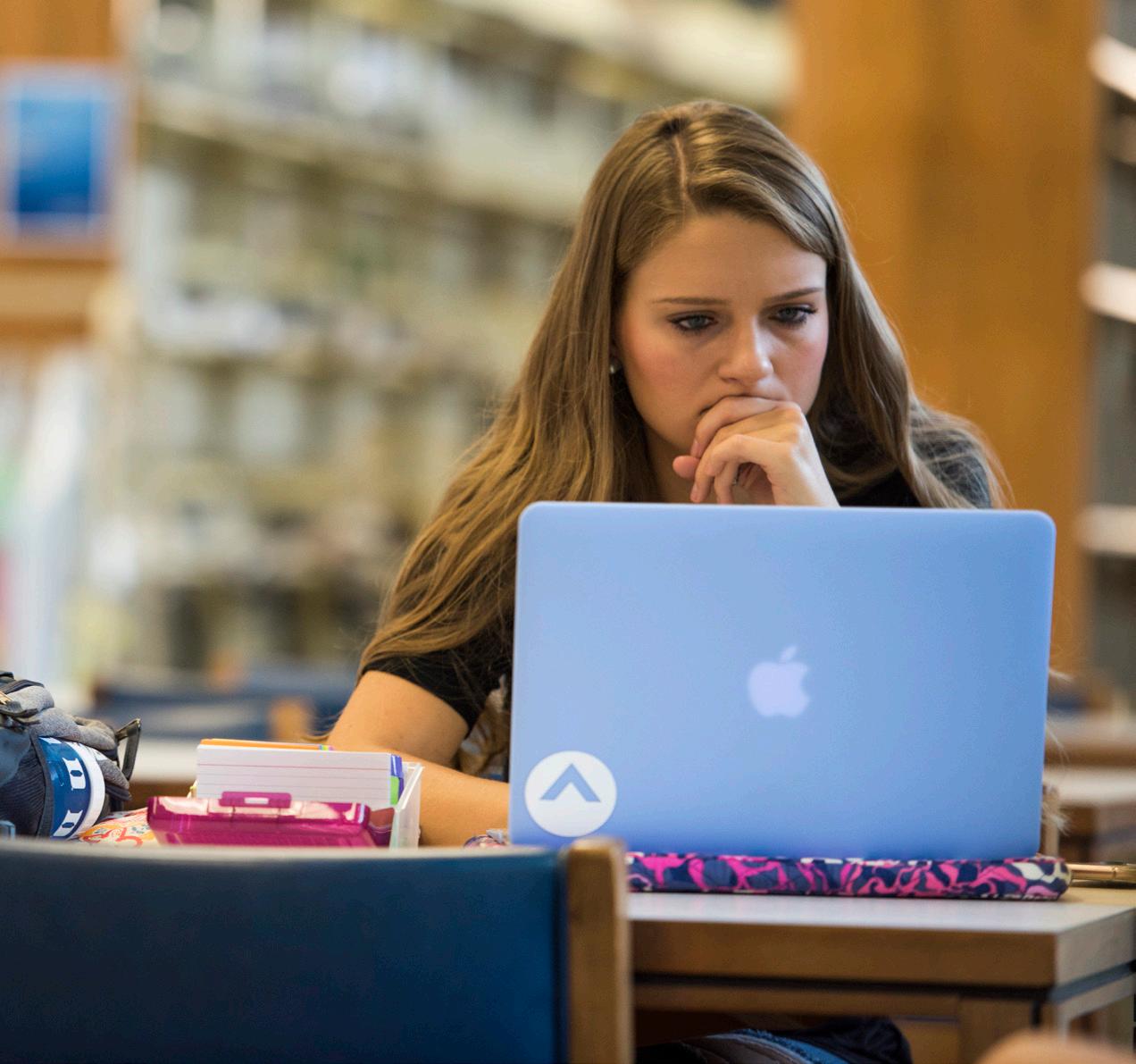
Melissa Mohlere
Carter and Misty Moler
Brittany Moore
B.M. and C.W. Moore
Jack and Jeanie Moore
Robin Moore
Maricella Morales
Stephen Morris
Perry and Hannah Morris
Ann Morris
Knox Morrison
John and Peg Morrison, Jr.
Elizabeth Morrow
Joshua Muench
Amanda Myers
Diana Myers
Myers Bros Gin, Inc.
Grace Mynatt
Cyndie Mynatt
Bunny Nash
Sherie Neely
Debra Neesmith
Nelson Hall & Associates, Inc.
Denisha Nesbit
Chris Nesbitt
New Sarum Brewing
Irvin and Sara Newberry
Paul and Melanie Newton
NGK Ceramics USA, Inc.
Niagara Bottling
Catherine Norris
Michele Norton
Brad Norvell
Edward and Susan Norvell
Novant Health - Matthews Medical Center
Novant Health - Mint Hill
Novant Health - Rowan Medical Center
Novant Health - Rowan Medical
Center Women’s Auxillary
Novant Health Medical CenterHuntersville
Novant Healthcare - Presbyterian
James O’Kelly
Ginger Pack
Katherine Page
Tena Pair
Meredith Parker
Douglas and Michelle Patterson
Sharon Craig Paul
Alisha Pendergrass
Pepsi Bottling Ventures, LLC
Kirby Todd Phillips
Terri Pickett
Darlene Pickman
Kathy Piper
Larry and Tammy Pittman
Cassie Plott
Plumbers & Pipefitters LU 421
Mary Ponds
Sarah Porter
Andrew and Mary Porter
Donald Post
David Post
Suzette Pounds
PPG Paints

Property Pal
Trent and Kelly Propst
PSNC Energy
Publix Super Markets Charities, Inc.
Jeanie Quellhorst
Michael Quillen
Smita Quinn
Robert Rakes
Mike Raney
Michael Ransom
Richard Reamer
Lori Reeder
Beatrice Reinhard
ReNew Petra
ReynGroup
Damon Richard
Cynthia Rickman
P.J. Ricks
Lora Riddle
Melony Ritter
Dennis Rivers
John and Holly Robbins
Brenda Robinson
Rocky River Golf Club
Ryan Rosa
Jennifer Rosalino
Thad Routh
Rowan Diagnostic Clinic, PA
Evander Rowell
Wendell and Vickie Rummage
Peggy Rummage
Jim Russell
Nathan Russell
Adam and Crystal Ryerson
S & D Coffee
Matthew and Irene Sacks
Steven Saine
Dusty Saine
Jill Salayi
Anni Satterfield
Robin Satterwhite
Eric Savage
Denise Schweizer
Edward and Noelle Scott
Jenn Selby
Frank Shafer
Sheetz
Sherwin-Williams
Shoe Show, Inc.
Carl and Luanne Short, Jr.
Mark and Melissa Shue
Ella Mae Small
Megan Smit
Robert and Susan Smith
Daniel Smith
Hayes and Susan Smith
Sherylle Smith
Carl Smith
Tom and Martha Smith
Miles and Kathy Smith, III
Southeastern Packaging
Southern Grace Distilleries
Elaine Spalding
Carol Spalding and Francis Koster
Sandra Spivey
Sportsfield Specialties, Inc.
Douglas and Janet Spriggs
Nancy Stanback
Sherry Stancliff
State of North Carolina DHHSDivision of Mental Health/DD/SAS
Robert and Glenda Steele
Brian Stevenson
LeAnn Nixon Stokes
Jillian Sturdivant
Chad and Kelly Tarlton
Adam and Ashley Taylor
Kenneth and Kathy Taylor
Jay Taylor
Taylor Clay Products Co., Inc.
Barbara Taylor-Lineberry
Team Honeycutt - Allen Tate Realtors
Donald Tezza
The Budd Group
The Charles A. Cannon Charitable Trust
The Margaret C. Woodson Foundation, Inc.
The Wine Room
Kenneth Theodos
Julie Thoman
Kasia Thompson
Laura Thompson
Tim Schenk Electric, Inc.
Tino Tile & Marble Co., Inc.
Trelleborg Boots North America, Inc.
David Trenor
David and Ashlinn Trexler
Ellen Troutman
Page Tucker
Benita Tulloch
Jonathan Turner and Amy Boger
Ed Tyson, II
United Beverage
Uwharrie Bank
Holly Vanager
Dakeita Vanderburg
Timothy and Gail Vaughn
Victaulic
Vogue Cleaners
Walter and Carol Vuchnich
Vulcan Materials Company
William and Anna Mills Wagoner
Nancy Waldrop
Tammara Walker
Robert and Sarah Walker
Seth Waller
Jason and Tracy Walser
Brandi Wardell
James and Kathy Waters
Brenda Weaver
Wells Fargo Foundation
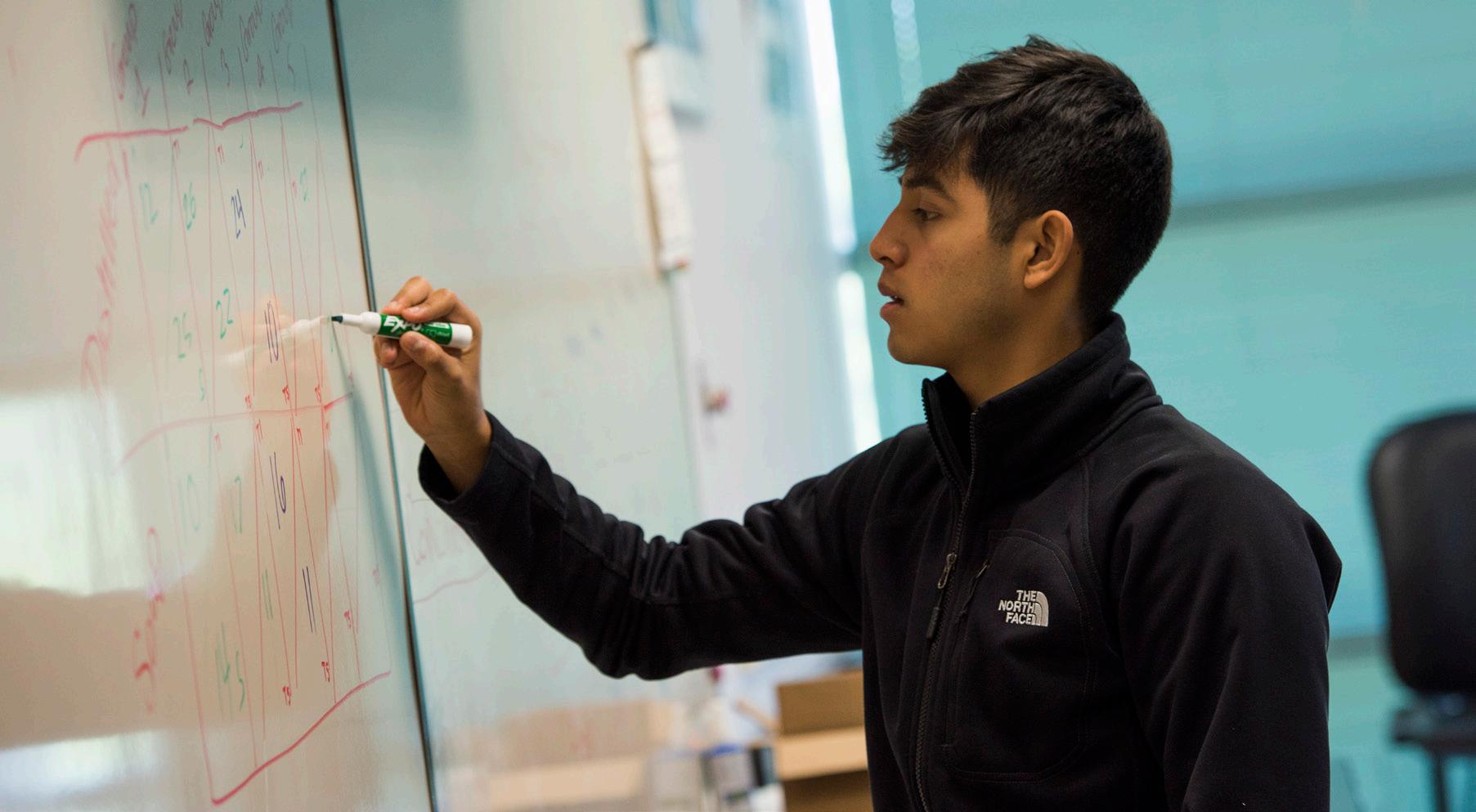

Sheryee West
Lauren Whaley
Gail Whitcomb
Jason White
Mark Whitley
Brannan and Whitney Williams
Zhiviaga Williams
Charles Willis
Michael Wilson
Nancy Wilson
Tracy Winecoff
Carter Wingfield
Ronald Wolfe
Woodson, Sayers, Lawther, Short, Parrott and Abramson, LLP
World Fibers, Inc.
Belinda Wyatt
Dennis Yates
Hope Yost
Families, friends and businesses honor and memorialize individuals, corporations and students through endowed gifts to the Foundation. Endowments are established and invested with a minimum gift of $15,000 and are permanent funding sources for programs, scholarships and other financial assistance. These funds provide the annual earnings to support these awards.
Ambassadors ($250,000 +)
Ralph W. Ketner Family Foundation Scholarship
Philip Morris USA Endowed Scholarship
RCCC General Endowed Scholarship Fund
Title III Endowment
Advocates ($100,000 +)
Charles R. Benson and James C. Deberry Memorial Scholarship
Food Lion Endowed Scholarship
Dr. Richard Brownell Endowed Merit Scholarship and Faculty/Staff Development Fund
Ervin W. and Miriam R. McCulloch Endowed Scholarship
Martha Edith Walker Estate Memorial Endowed Scholarship
Champions ($75,000 +)
AkzoNobel Corporation Endowed Scholarship
Partners ($50,000 +)
Dean R. and Betty I. Andrews Endowed Scholarship
Evelyn Kenerly Germann and William Joseph Germann Memorial Endowed Scholarship
Dai Nippon Endowed Scholarship
Edward and Susan Norvell Endowed Scholarship
Promoters ($25,000 +)
Cabarrus Rescue Squad Endowed Scholarship
Lane C. Drye Memorial Endowed Scholarship
Susan Elaine Harrison Memorial Endowed Nursing Scholarship
The North Carolina Paraplegia Association Endowed Scholarship
The Optimist Club Endowed Scholarship
The Salisbury Lions Club Clyde H. Harriss Memorial Endowed Scholarship
Student Emergency Scholarship Endowment
Susan J. and Robert M. Smith Endowed Scholarship
Waddell Professional Development Endowed Fund
Endorsers ($15,000 +)

Walter Almeida Endowed Scholarship
Brown Family Fire Protection Technology Endowed Scholarship
Dr. Jarrett T. Chandler, Jr. Endowed Scholarship
Michael Chreitzberg Endowed Scholarship
Edna J. Chrin Memorial Endowed Scholarship
Larry Cloninger Family Endowed Scholarship
Helen B. Earnhardt Memorial Scholarship
Charles C. Erwin Endowed Scholarship
Rachel B. Gaskey Memorial Scholarship
Carla G. Howell Endowed Scholarship
Sam R. and Louise May Endowed Scholarship
Jeanie H. Moore Endowed Scholarship
Graham Spencer Endowed Scholarship
Ben Mynatt Family Endowed Scholarship
Rowan-Cabarrus Community College Student
Emergency Scholarship Fund
William and Nancy Stanback Scholarship Endowment
Other Endowed Funds
C.C. Erwin Memorial Endowed Scholarship
China Grove Civitan Memorial Endowed Scholarship
Michael A. Johnson Scholarship
Concord Rotary Club Endowed Scholarship
Draft and Design Endowed Scholarship
Richmond Gage Memorial Endowed Scholarship Fund
Clyde H. Harriss Family Memorial Endowed Scholarship
Eddie Myers Memorial Endowed Scholarship
National Tool and Machinery Endowed Scholarship
Carroll T. Overton Endowed Scholarship
Marion Purcell Endowed Scholarship
STEAM Endowed Scholarship
Gifts of $1,500 or more may create a named scholarship or program fund. Contributions at this level offer the financial support for successful completion of a certificate, diploma or degree. Program funds provide enhancements to the classroom and learning experience.
Bobbie Lois Lusk Abshire Scholarship
Building a More Prosperous Community Scholarship
Patricia F. Burke Scholarship
Pat and Jack Chaffin Nursing Scholarship
Construction Financial Management AssociationCharlotte Chapter Scholarship
Corporate and Continuing Education Scholarship
F&M Bank Merit Award
GED Scholarship
The Maria Hall Emergency Assistance Scholarship Fund
Harrison RV Trade Scholarship
Al Hoffman Scholarship
Honeycutt, Horton, Vanderburg, Propst and Brown Scholarship
James & Agnes Liles Family Trust Scholarship
James and Agnes Liles Family Trust Scholarship
Mechanical Trades Carolina Scholarship
NCLEX Assistance Scholarship (RN/LPN)
Dora Anna Newton Scholarship
North Carolina Manufacturing Institute Sustainability
Scholarship Fund
North Carolina Motorsports Foundation Scholarship
Novant Health Rowan Medical Center Auxiliary Scholarship Fund
Lillian C. Peeler Memorial Scholarship of the Salisbury Woman’s Club
Nadine Potts and Jo Franklin Excellence in Nursing Scholarship
Providence United Methodist Church - The Formal Wyatt Nursing Scholarship
Providence United Methodist Church -The Gernal “Buddy” Lowman Scholarship
Providence United Methodist Church -The Hilton J. Swindell Memorial Scholarship
R.A.D. Alumni Scholarship
Radiography Scholarship Fund
Dr. L.H. Pete Robertson, Jr. Radiography Scholarship
Rowan-Cabarrus Student Emergency Scholarship Fund
Rowan-Cabarrus Student Impact Grant Fund
Salisbury Rotary Club Scholarship
Shoe Show Scholarship
The Derek Sorrell Memorial Scholarship
The Salisbury Rotary Club Scholarship
Top Scholar Presidential Scholarship Award
Weyerhaeuser Scholarship
The Margaret Woodson Foundation Scholarship
The Rowan-Cabarrrus Community College Foundation would like to express appreciation to Fred & Alice Stanback for their support of the North Campus solar project and student scholarships.
Duke Energy and Piedmont Natural Gas Foundation: Community College Grants Program – funding to support the Industrial Maintenance Apprenticeship program via scholarships, equipment and instructional supplies - $200,000 (four year grant period)
Food Lion Feeds Charitable Foundation: funding to support the student resource pantry and nutrition education - $2,000
Gene Haas Foundation: funding supports scholarships for machining and engineering technology students and sponsorship of project teams in competitions such as Skills USA - $15,000
The Leon Levine Foundation (Year 3): Funding for Healthcare Education - $60,000
(Total Award $300,000 over a five year grant period)

The Margaret C. Woodson Foundation: Annual scholarships and student emergency funds –$35,000
National Institutes of Health (NIH): Bridges to Baccalaureate (B2B) program – in collaboration with UNC-Charlotte and Gaston College, this subaward via UNC-C will support activities to address the needs of academically qualified students to foster success beginning at the Community College and continuing through UNC-C in the area of
Biomedical Sciences. $50,701 (Year 1 of 5)
National Science Foundation (NSF) Advanced Technological Education (ATE): Increasing Women in Engineering and Industrial Technologies (WE IT) – funding will support strategies in changing the perceptions of these industries within the populations of career influencers and potential students, specifically targeting and engaging female students to increase their awareness of these occupations. - $224,093 (three year grant period)
National Science Foundation (NSF) Scholarships in Science, Technology, Engineering and Math (S-STEM): STEM Persistence and Retention via Curricula, Centralization, Cohorts, and Collaboration (SPARC4) – this grant, a collaboration with UNC-Charlotte and Gaston College, will improve students’ academic and social preparation for the college context and reduce the probability of experiencing “transfer shock” upon enrollment at a four-year institution. Funds will provide eligible students’ scholarships to both Rowan-Cabarrus and UNC-C upon transfer. Approximately 15 students may receive up to $6,000 per year to cover unmet financial need. - $1,027,715 (five year grant period)
North Carolina Community College System: Funding to support Career Coaches in three area high schools - $79,927 (year 2)
North Carolina Community College System: funding to support the expansion of the Career Coach program - $356,383 (three year grant period)
North Carolina Community College System: Male Minority Success Initiative – funding provided to improve the retention and graduation rates of minority male students - $17,234
North Carolina Community College System: NC Space grant - Funding for students to design, engineer, test fly and recover a helium balloon to the edge of space – $2,750
North Carolina Problem Gambling Outreach/ Prevention/Awareness Plan: Marketing and Graphic Design student competition project - $5,000
NC Sci-Fest sponsorship grant: STEM Open House sponsorship award - $1,000
Nuts, Bolts and Thingamajigs: funding to support 2018 summer manufacturing and entrepreneurship camp program for youth - $1,500
Rowan County Convention and Visitors Bureau/ Tourism and Marketing Support funds: FY18 NC Community College Fine Arts Conference - $3,000
U.S. Dept. of Education: 2016/17 Carl D. Perkins
Career and Technical Education Act Grant - Funding for career and technical education in student services and curriculum (includes Reserve funds awarded) – $316,697
Wells Fargo Foundation: Building a More Prosperous Community campaign - $12,500
Weyerhaeuser Giving Fund: Student scholarships$2,000
Workforce Innovation and Opportunity Act (Title II): Adult Education and Family Literacy – funding to support adult education and literacy activities$385,296
Total for 2017: $2,797,796
1: Prepare students for careers and opportunities that stimulate sustainable economic and workforce development.
Objectives:
A. Identify and respond to regional market needs with focused career education and training programs built for existing and emergent careers.
1. Launched Light Construction Building Trades as a public-offering course (previously only offered in the immured facility, Piedmont Correctional Institute) in both counties during 2018 in response to the high demand for local construction workers.
2. Improved and expanded the paramedic continuing education program, resulting in enrollment which more than doubled during the most recent cohort.
3. Held Taste of Industry event funded by the Duke Foundation, which was attended by English, Computer, Science teachers, and Career Technical educators from local high schools to learn more about the College’s Engineering, Information Technology, and Industrial programs.
4. Coordinated and held the first Health and Education programs Interprofessional Education Day, in which 120 students, 30 faculty members and several volunteers participated in four simulated realistic medical emergency scenarios.
5. Completed more than 3,000 hours of community service, including service learning, by the Health and Education programs.
6. Reinvigorated the Motorsports Technology program based on extensive industry analysis, hired a new program chair, and revised the curriculum.
7. Held four truck driver training classes in 2018, graduating 57 out of 67 students.
8. Celebrated 65 graduates from the North Carolina Manufacturing Institute with 49 (75 percent) graduates obtaining employment.
B. Improve accessibility and eliminate barriers to student success.
1. Provided over 390 students with scholarship assistance totaling more than $330,000.
2. Provided 200 GED test vouchers through the RCCC Foundation.
3. Started Therapeutic and Diagnostic Services diplomas for Career & College Promise students to provide a pathway for high school students into healthcare programs.
4. Held weekly open studio hours for the Department of Fine & Applied Arts to accommodate students’ need for access to programmatic equipment, materials, and technology outside of class time, providing the
opportunity for one-on-one tutoring in art and design.
5. Graduated the first cohort of Advertising and Graphic Design certificate students at A.L. Brown High School in spring 2018.
6. Recorded 166 reference transactions as a part of the library’s new campus outreach program, Mobile Mondays, in which pop-up librarians appeared at various campuses in locations with high student traffic to assist with finding books, articles, and information for assignments.
7. Awarded the Traveling Archivist Program (TAP) Grant by the State Library of North Carolina, which provides free consulting services to organize, catalog, and make the archive collection accessible.
8. Collaborated with the Tutoring Center and Academic Programs to provide student workshops on discipline-specific research in the library.
9. Developed and offered 26 workshops that served 100 students in the library.
10. Implemented an integration with the College’s Blackboard courses, which provides students with seamless access to the library’s online subject and course guides, providing point-ofneed access to all of the library’s resources and services.
11. Implemented the RISE Developmental Redesign in collaboration with the North Carolina Community College System and NROC.
12. Ranked fourth in the national 2017-2018 Digital Community Colleges Survey Top Ten Ranking Winners by the Center for Digital Education for the use of digital technologies to improve services for students, faculty, staff, and the community.
13. Rolled out single sign-on for all online student services including registration and records systems.
14. Recognized by the Hyland Corporation for innovation through the OnBase student short application system.
C. Provide learning options that lead to certifications, diplomas, and degrees by participating in the American Association of Community Colleges’ (AACC) National Completion Agenda.
1. Added a Bridge Program option for Licensed Practical Nursing (LPN) students to seamlessly enter the Associate Degree Nursing AAS degree program.
2. Added the Associate in Engineering degree program and the Associate in Engineering Career Transfer Pathway.
3. Added the Associate in Fine Arts in Visual Arts Career Transfer Pathway.
4. Added the Automotive Light-Duty Diesel
Technology Diploma and Certificate.
5. Added the Mechatronics Engineering Technology AAS, Diploma and CTE Certificate.
6. Added Physical Therapist Assistant (2-year program) to begin in spring 2019.
7. Added new Therapeutic & Diagnostic Service Nurse Aid diplomas for pre-health students in Associate Degree Nursing, Radiography, Occupational Therapy Assistant, and Physical Therapist Assistant (2-year program).
8. Updated the Early Childhood Education North Carolina Community College Curriculum Standard, adding three AAS degrees: Early Childhood Education Career Ready (NonTransfer) AAS, Early Childhood Education Transfer B-K Teacher Licensure AAS, and Early Childhood Education Transfer Non-Licensure AAS.
9. Implemented new curriculum for CSC-134 and 234 (C++ Programming Courses) in order to meet the needs of the new Associate in Engineering degree program.
10. Started the new Healthcare Management Technology degree to reflect the more modern needs of electronic health records and working with insurance claims and coding in a digital environment.
11. Streamlined the curriculum by revising 16 associate degree programs, five diplomas, and six certificates.
D. Accelerate degree completion by leveraging prior learning assessment.
1. Proctored over 9,200 tests in the College’s testing centers including 1,979 academic tests for online students and students missing in-class exams; 3,402 placement tests for new or returning students; 101 Credit for Prior Learning CLEP or DSST exams; 1,993 Pearson VUE exams; 1,468 high school equivalency exams; and 630 TEAS/HOAE/Kaplan (Allied Health Admissions) tests.
2. Awarded an additional 18 students associate degrees as part of the Reverse Transfer program with the UNC system.
E. Lead local and regional Science, Technology, Engineering, Arts & Mathematics (STEM) initiatives.
1. Hosted STEM Open House at RCCC@NCRC for more than 300 local K-12 public and private students and more than 400 members of the community.
2. Completed a major renovation project of outfitting a school bus into a STEM bus, which had been purchased by the Rowan-Salisbury School System and funded through a $30,000 donation, by the Auto Body Repair class at Piedmont Correctional Institute to be used for

Goal 1 – Learn
How can Rowan-Cabarrus Community College increase the community’s educational attainment that leads individuals, families and the region to prosperity, sustainability and success?
Goal 2 – Engage
How can Rowan-Cabarrus Community College best prepare students to be responsible and productive citizens?
Goal 3 – Innovate
How can Rowan-Cabarrus Community College serve the Community of the Future?
Goal 4 – Lead
How can Rowan-Cabarrus Community College be a catalyst for change?
Rowan-Salisbury School System students.
3. Hosted “The Masters of Metal” summer camp, funded by Nuts, Bolts and Thingamajigs and the Foundation of Fabricators and Manufacturers Association, for kids between the ages of 12-16.
4. Competed in the North Carolina Space Grant High Altitude Weather Balloon Competition and was awarded Best Team Work and Best Picture/Video.
5. Participated in the first STEM EXPO held at Charlotte Motor Speedway, which was attended by 15,000 students, in September 2018.
6. Hosted the fifth annual statewide North Carolina Community College Fine Arts Conference, the lead professional development opportunity for faculty teaching visual arts, music, and theater across North Carolina’s institutions of higher education.
2: Foster a culture of learning that inspires academic excellence and promotes student success.
Objectives:
A. Deliver innovative, technology-enabled and high quality instruction.
1. Identified, ordered and secured advanced simulation technology manikins for the
paramedic program.
2. Secured an ambulance for use by the EMS education programs through a partnership with Cabarrus County EMS.
3. Recognized Advertising and Graphic Design student Corrin Skinner as the winner of the statewide community college design contest for the North Carolina Community College System Conference program cover.
4. Celebrated Associate in Fine Arts in Visual Arts graduate Bailey Wingler for her selection as one of the “Class of 2018 Artists” to be highlighted in the esteemed ArtPop public art program in the greater Charlotte region.
5. Updated the two digital studios serving the Advertising and Graphic Design and Associate in Fine Arts in Visual Arts programs with brandnew Mac computers on the North and South Campus.
6. Implemented a new faculty portal in Tutor. com, enabling faculty to have instantaneous access to online tutoring reports and session transcripts between their students and the tutors, as well as receive early alerts for students who have been flagged as struggling.
7. Expanded the new smart classroom standard to more than 20 new spaces and upgraded the classroom technology for more than 100 classrooms.
B. Enhance learning outcomes by developing expertise in effective teaching practices, curriculum pathway design, instructional technologies, learning assessment and student development.
1. Began implementation of Paideia.
2. Began a curriculum revision of the Advertising and Graphic design program to ensure the course content is relevant to students and delivered consistently across the department.
3. Provided a three-day training and professional development program through the Center for Teaching and Learning focused on accessibility, classroom impact, and college initiatives. Over 1,300 hours of professional development were completed by faculty and 156 certificates were earned in the areas of student support, safe instructor, and Title IX.
4. Delivered 231 in-service courses for 66,288 training hours for Criminal Justice Law Enforcement personnel, with students earning 5,362 certificates.
C. Reaffirm accreditations from SACSCOC and other accrediting bodies through successful completion of required self-study, Quality Enhancement Plan, and other accrediting agency requirements.
1. Completed the Committee on Accreditation of Educational Programs for the Emergency Medical Services Professions (CoAEMSP) letter
of review period and site visits for accreditation of the paramedic program.
2. Received acceptances/approvals from SACSCOC for the following substantive changes for new programs: Associate in Applied Science in Physical Therapist Assistant (PTA), the Associate in Engineering, the Associate in Applied Science in Mechatronics, and the Diploma in Light Duty Diesel.
3. Received approval from SACSCOC for North Rowan High School as an off-campus instructional site offering 50 percent or more of a program and the relocation of the Cosmetology program to College Station.
4. Received candidacy status for accreditation for the Physical Therapist Assistant program and enrolled the first cohort of 20 students.
5. Completed year four of the Quality Enhancement Plan: SEEK.
D. Continuously improve programs and services through focused, systematic and ongoing unit reviews and annual planning.
1. Updated the Online Instructor Certification (OIC) course with enhanced accessibility content and was re-certified by Quality Matters with a score of 95 out of 98 possible points on the first review (no changes requested).
2. Facilitated four library focus groups across North, South, NCRC, and CBTC campuses comprised of students, faculty, staff, and administrators to identify patterns and themes which could become common discussion points among stakeholders regarding strategic planning and the future direction of the library, and develop the 2018-2021 Library Strategic Goals.
E. Improve achievement on Performance Measures established by the North Carolina Community College System (NCCCS).
1. Received a pass rate of 98 percent for the AND NCLEX, which was above the North Carolina pass rate of 84 percent and the national pass rate of 88 percent.
2. Received a 100 percent pass rate for PN NCLEX, which was above the North Carolina pass rate of 82 percent and the national pass rate of 86 percent.
3. Implemented the Office Hour Initiative in English and Math, and faculty reported a 31 percent increase in student contacts (1,529 to 1,996) from fall 2017 to spring 2018.
F. Continuously improve completion rates.
1. Improved on completion rates with the Associate in Fine Arts in Visual Arts and succeeded in raising the graduation rate by over one percent compared to 2017, achieving a total completion rate of over 20 percent for
Advertising and Graphic Design students.
2. Achieved a 100 percent pass rate for the seventh consecutive year in the College’s Radiography program.
3: Provide excellent service to current and prospective students, colleagues, businesses, industries, and the community.
Objectives:
A. Enhance access to academic support, technology and financial services for students.
1. Expanded tutoring services into a larger location at CBTC, accommodating an increased number of students and topics.
2. Developed a partnership between Tutoring Services and the Math and English departments on the RISE pilot for the developmental redesign to offer all corequisite students for MAT-052, MAT-071, and ENG-011 opportunities for weekly tutoring assistance.
3. Conducted approximately 500 hours of tutoring support for ENG-011 students during fall 2018 and 2,675 hours for MAT-052 and MAT071 support.
4. Collaborated with the Center for Teaching and Learning for the library to host the Listen First project and guest speaker at North and South Campus.
5. Successfully partnered with an online bookstore provider to implement an initiative to lower the cost of textbooks for students.
6. Opened the Beacon’s Nest Spirit Store on North and South Campus, creating an experience that truly supports students, empowering them to make deeper connections with the College, their friends, and instructors, and ultimately succeed academically.
B. Engage students in planning and developing their educational goals and career pathways, including co-curricular experiences.
1. Celebrated the College’s national SkillsUSA winner in Dental Assisting, Heidi Swinson and the College’s first female National Skills USA winner in Masonry, Ashton White.
2. Led at least two campus visits to transfer institutions to assist students in the transfer research process by the Department of Fine & Applied Arts.
3. Integrated the first student member into the Rowan-Cabarrus delegation attending the annual Appalachian Energy Summit where schools with the UNC and North Carolina Community College Systems gather to share sustainability initiatives and celebrate successes.
C. Foster a culture of inquiry, improving the use of data and technologies to strengthen service.
1. Implemented TimeClock Plus, which is a time and attendance solution that integrates with Colleague to process payroll and human resources data.
2. Installed new wireless networks at CBTC, NCRC, College Station, and parts of North Campus.
3. Completed technology implementation for the construction of College Station and CBTC Annex/Motorsports.
4. Released a new accessibility checking system for all online courses.
5. Implemented a new student survey tool for all courses.
6. Upgraded the bandwidth for all campuses and modernized the networking infrastructure at CBTC, NCRC, and College Station.
7. Upgraded the student engagement system, NAVsync, to enhance connectivity and collaboration between the College and students.
8. Completed 13 OnBase application development projects to enhance workflow capabilities and efficiency in processes for the College.
9. Released an upgraded version of the College’s interface to the enterprise resource planning system.
10. Partnered with Microsoft to deploy server environments and disaster recovery technology into the Cloud.
11. Released a new video conference solution for use throughout the College.
12. Implemented a new point of sale system and inventory system for the new spirit store.
13. Built a new connection tool/API for applications to more easily work with one another, simplifying the technology experience for students and staff.
4: Acquire, develop, and manage human, fiscal and physical resources essential to the development and delivery of technology-enriched, high value education and service.
Objectives:
A. Plan and optimize resources in a fiscally responsible manner.
1. Received exemplary audits of financial statements and internal control compliance for both the College and Foundation.
2. Collected a total of $303,796.79 in outstanding monies owed to the College.
B. Secure public and private funding in support of the college’s mission.
1. Managed an awarded amount of $114,000
from the North Carolina Community College System dedicated to short-term training to develop the Light Construction Building Trades program and purchase necessary equipment and supplies.
2. Awarded a $1.1 million National Science Foundation Grant with funding for 15 students to each receive a $6,000 scholarship annually.
3. Awarded a $400,000 National Institute of Health grant to support undergraduate research in biology.
4. Awarded a $10,000 grant from Mapping Upward for “Industry Informed Stackable Credentials” with a focus on involving local industry and advisory board members in the credentialing process and professional certifications.
5. Awarded Open Education North Carolina Faculty Adoption grants to pilot OpenStax textbooks in biology.
6. Received several significant in-kind donations from generous partners, including Dr. Francis Koster, F&M Mafco, Clinical Engineering, and more.
7. Secured $3,223,002 in funding through the RCCC Foundation to support the College’s highest priority needs and student scholarships from the Annual Fund, Family Campaign, Golf Tournament and the Scholarship Luncheon.
C. Provide facilities that are safe, welcoming, sustainable, and flexible to support the college’s mission.
1. Began construction of the Advanced Technology Center, which will be located at the North Carolina Research Campus in Kannapolis.
2. Completed construction of College Station in partnership with the City of Kannapolis, which allowed relocation of the College’s Cosmetology program to the newly renovated facility at 489 Cannon Boulevard.
3. Completed remodel of spaces in the CBTC Annex, which house the Light Diesel program.
4. Completed remodel of spaces within Building 200 at North Campus, which house the Mechatronics program.
5. Completed a major refresh of Building 2000 at South Campus, which included new paint, new flooring, new ceiling tiles, and enhancements to the air conditioning system.
6. Completed a renovation of the Student Center at South Campus.
7. Completed fitting out of spaces within Building 600 at North Campus, which houses the Physical Therapist Assistant Program.
8. Completed LED lighting upgrades in Building 400, 700, 800, and North Campus parking lots which will improve lighting quality and energy
efficiency.
9. Completed the College’s first mass notification system at College Station, which will allow audible, visual and text messaging of safety directives during emergencies.
10. Completed installation of electronic access controls at South, CBTC, and College Station campuses, which will allow remote lock down of the campuses in emergencies, but also scheduled locking and unlocking of the buildings as well as key card access which tracks individuals who access buildings after hours.
D. Be the employer of choice.
1. Hosted a College Health Fair with more than 100 employees and students approximately 30 external partners in attendance.
2. Offered onsite vaccination clinics and health checks for employees in both Rowan and Cabarrus counties.
3. Conducted walking challenges, in spring and fall, in support of the College’s wellness focus.
4. Participated in the “58 Strong Community College 2018 Keep Pounding 5K Run” in support of Pediatric and Adult Cancer.
5. Promote women’s wellness through on-site Mobile Mammography Units for both North and South campus.
E. Build an inclusive, performance-based culture aligned with core values.
1. Held all employee meetings and Q&A sessions for College faculty and staff at the beginning of both the spring and fall terms to facilitate communications and build relationships.
2. Enhanced communication with employees by sending six President’s Messages outlining the College’s latest updates and priorities.
3. Held focus group meetings for College employees to facilitate communications, build relationships, and understand professional development needs.
4. Implemented Diversity and Inclusion committee, joined the Higher Education Recruiting Consortium (HERC), and the North Carolina Universities and Colleges Consortium for Diversity, Equity, and Inclusion.
5. Implemented diversity training for all College employees as part of a College-wide focus on diversity and inclusion for the 2018-2019 academic year to help the College foster a work environment in which all individuals are treated fairly and with respect, while also having equal access to opportunities and resources.
F. Strategically support leadership and professional development opportunities.
1. Managed 2,875 hours of individual professional development of employees.
2. Offered multiple public safety seminars for students, faculty and staff, which resulted in over 900 hours of instruction on topics ranging from Managing Crisis in the Classroom, Incident Reporting, CPR/AED/Opioid Overdose, and Winter Weather Safety (including driving simulator sessions).
5: Serve as a catalyst for advancing the region.
Objectives:
A. Build, cultivate, and maintain excellent relationships locally and state-wide with leaders and innovators to increase support and influence practices and regulations affecting community colleges.
1. Executed strategic conversations with the Board of Trustees, the College’s legislative delegation, representatives of the University of North Carolina System, and other community stakeholders.
2. Recognized as one of ten finalists for the prestigious national Bellwether awards in the planning, governance, and finance category for the e-textbook initiative.
3. Planned, created, and hosted the first-ever training symposium focused on interviewing persons with intellectual disabilities, which brought together subject matter experts and community partners to educate law enforcement officers on the best practices of interviewing victims.
4. Led the technology sub-committee for the state ERP RPF project.
5. Promoted participation by staff, faculty, and administrators at the local, state, and federal levels. College employees serve as officers on local Chamber Boards, within Rotaries in both counties, numerous boards, and in national higher education organizations.
B. Expand the region’s workforce by attracting, retaining, and developing high quality talent.
1. Offered 231 courses, completed 66,288 training hours, and awarded 5,362 certificates in the Basic Law Enforcement Training program.
2. Conducted multiple advisory committee meetings with public safety stakeholders to address local needs.
3. Coordinated and managed 17 customized training projects, served 24 companies, and trained a total of 2,251 people in customized training projects.
C. Partner with employers to establish seamless transitions between education and work.
1. Provided 52 free Small Business Center seminars for local small businesses with 400 attendees and counseled 67 individuals.
2. Hosted four agripreneur networking events
through the Small Business Center to connect business and agriculture.
3. Graduated 45 BLET students with 41 of 45 graduates (91.1 percent) securing employment within six months of their graduation date.
D. Collaborate with economic development partners to promote entrepreneurial opportunities and job growth within the region.
1. Helped create 50 jobs and assist with 13 business start-ups through advising and coaching provided through the RowanCabarrus Small Business Center.
2. Served over 495 students in Work Based Learning, with 178 students being placed in 133 businesses.
3. Developed student placements with 24 new businesses for Work Based Learning opportunities.
E. Expand the college role as a community partner in developing citizens who work to improve the quality of life.
1. Partnered with the City of Salisbury and the City of Kannapolis to provide student sponsorships for their city residents to take the Light Construction Building Trades program. Additionally, through this partnership, the City of Salisbury sponsored City residents to take the Medical Coding and Billing Specialist and Forklift courses.
2. Launched the Agripreneur Academy & Network in partnership with the College’s Continuing Education Training Services Department and in collaboration with Elma C. Lomax Incubator Farm.
3. Held a small business summit in partnership with Downtown Salisbury, Inc.
4. Participated in the tenth annual Salisbury Sculpture Show by hosting a professional sculpture on campus.
5. Partnered with East Cabarrus Historical Society where history and humanities faculty served as docents for The Way We Worked, a Smithsonian traveling exhibit.
6. Visited and lectured at Trinity Oaks Retirement Center in Salisbury, engaging residents in a series of lectures and book discussions.
7. Provided multiple disaster training opportunities to better prepare the public safety community for local and state level response.
8. Delivered multiple instructor level courses to enable public safety partners to further train staff.
9. Celebrated the sixth year of the annual “Reading Across Rowan & Cabarrus Counties” book drive by sending over 50 volunteers (faculty, students and staff) to nine elementary schools, donating 806 gift-wrapped books.

State Aid & State Capital Aid
Noncapital Grants & Gifts
County Aid & County Capital Aid
Sales & Services, Net
Funds appropriated by the State of North Carolina support most College operations. State tuition from all of the 58 community colleges is pooled at the state level and used to fund a portion of each college’s state budget allocations. Curriculum tuition rates are set by the North Carolina General Assembly. The College’s tuition rates did not increase and remain at $76 per credit hour for in-state tuition and $268 per credit hour for out-of-state tuition.
The College’s Financial Statements for the year ending June 30, 2018, report operating and non-operating revenues totaling $54,065,565.55. This includes state current aid of $30,340,055.61 and $861,086.69 for state capital aid. County current appropriations for the year totaled $5,156,638 while county capital aid was $2,588,740.07. The remaining revenue was from grants, sales and services receipts and student financial aid monies that are pass-through dollars to the student. Additionally, the total revenue figure includes $2,758,853.99 in student tuition and fees, but it is important to note that state tuition monies are remitted to the state and not kept by the College. The College continued capital projects at multiple campuses in both counties during the year utilizing state capital dollars, Cabarrus County bond dollars and special capital appropriated funds from both counties to fund critically important renovation and construction projects.
Operating revenues decreased by $1,216,151.63 to $3,521,332.42 for fiscal year 2018 primarily due to a
Capital Gifts
Investment Income
Other Operating Revenues

Student Tuition and Fees
Student Financial Aid
Total Revenues: $54,756,685.91
decrease in student enrollment. Net nonoperating revenues increased by $692,069.26 to $46,475,078.05 in fiscal year 2018. The increase is primarily due to an increase in county appropriations of $349,808.00 and an increase in noncapital grants of $299,298.00. The increase in county appropriations is primarily due to an increase in the operating budget, and the increase in noncapital grants is due to the College receiving two new grants from the Golden Leaf Foundation to start and develop mechatronics and light diesel technology programs.
Operating expenses for fiscal year 2018 decreased $431,004.78 to $51,468,800.90. The change was primarily due to the decrease in services expense of $284,210.89 attributable to a decrease in contracted services for maintenance expenses from the prior year. Scholarships and fellowships also decreased by $625,480.51 primarily due to a decrease in the enrollment of students who qualified for student financial aid. These decreases were offset by an increase in depreciation expense in the amount of $306,847.69, resulting from the College depreciating new capital assets placed in service.
In Fiscal 2017-2018, the College helped 3,565 students receive financial aid totaling $11,785,159. The aid included $9.76 million in Pell grants which assisted approximately 2,903 students. The College also served and certified 229 veteran students who received $564,589 from the Department of Veteran Affairs.
Instruction
Academic Support
Student Services
Institutional Support Operations and Maintenance of Plant
Student Financial Aid
Auxiliary Enterprises
Depreciation
Total Expenditures: $51,468,800.90
Carl M. Short, Jr. | Chair
Cynthia L. Mynatt | Vice Chair
Carol S. Spalding, Ed.D. | President and Secretary to the Board
Marjorie T. Benbow
J. Thomas Bost
Paul A. Brown
Darise D. Caldwell, Ph.D.
R. Daryl Cox
Jeanne A. Dixon
Patricia G. Fulcher
Patricia K. Horton
Lynn G. Marsh, Ph.D.
Robert S. Misenheimer
Stephen M. Morris
Dakeita Vanderburg
Eva Nicholson | Student Government Association President
Edward Norvell | Chair
Cordelia Andrews | Vice Chair
Janet Spriggs, Ed.D., | Treasurer

Carol Spalding, Ed.D. | Secretary
Karen Alexander
Marjorie Benbow
Dan Boone
Brad Bost
Paul A. Brown
Doug Cremer
Paige Crowe
Kevin Crutchfield
Jeanne A. Dixon
Dianne Greene
Tim Hagler
Denise Hallett
William Brian Hiatt
Patricia K. Horton
Barbi Jones
Barbara Mallett
Robin Moore
Knox Morrison
Kelly Propst, Ed.D.
Smita Quinn
P.J. Ricks
Bob Smith
Elaine Spalding
Jonathan Chamberlain, B.B.C. Chief Officer, College Environment
Ken Ingle, M.S. Chief Officer, Information Services/CIO
Craig Lamb, M.A. Vice President of Corporate & Continuing Education
Michael Quillen, Ed.D. Vice President of Academic Programs
Janet Spriggs, Ed.D. Chief Operating Officer
Rowan-Cabarrus Community College improves lives and builds community through public higher education and workforce development.
Rowan-Cabarrus Community College is an open-door, comprehensive learning-centered institution of higher education serving the citizens of Rowan and Cabarrus counties. The College, a member of the North Carolina Community College System, offers affordable occupational and education programs leading to Associate in Arts Degree, Associate in Science Degree, Associate in Fine Arts Degree, Associate in General Education Degree, and Associate in Applied Science Degrees. Diplomas and certificates are awarded for other occupational, adult and continuing education programs. The primary focus of the College’s offerings is on workforce development by meeting the educational needs of the individual and meeting the changing training requirements of business and industrial firms as well as other employers in the service area. Reflecting its commitment to student learning outcomes, the College strives to inspire its students to increase their knowledge, develop occupational and technical proficiencies, respond to lifelong learning opportunities, and increase their awareness as responsible citizens in a democratic society.
Building sustainable futures through the power of learning.
• Excellence and innovation in education and workforce training;
• Continuous improvement through lifelong learning and achievement;
• Trust, integrity, inclusiveness, and mutual respect;
• Exemplary service through team work;
• Responsibility, sustainability, accountability;
• Leadership, partnership and global citizenship.
